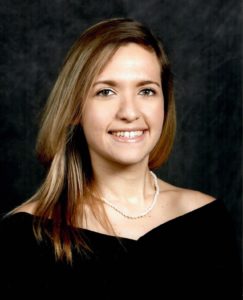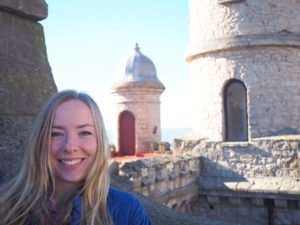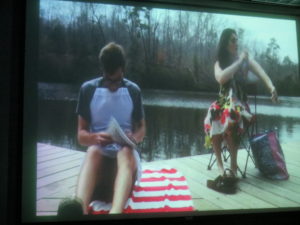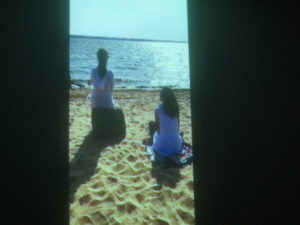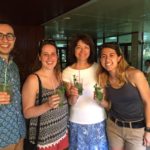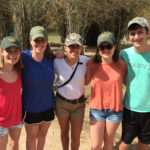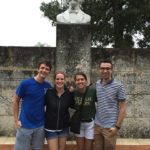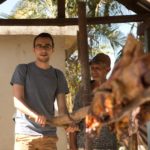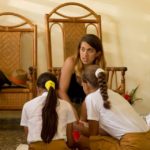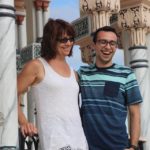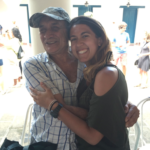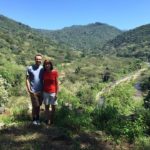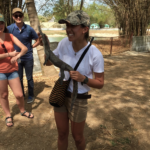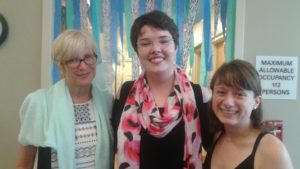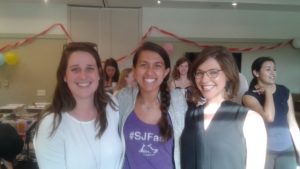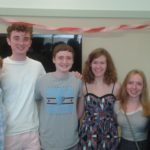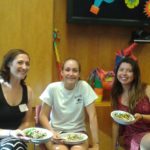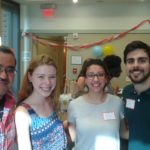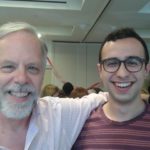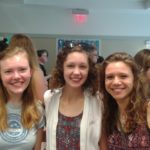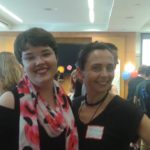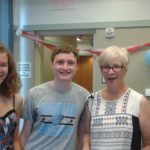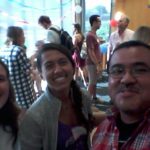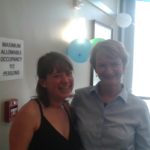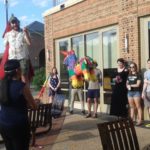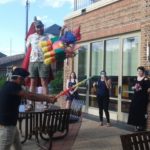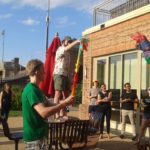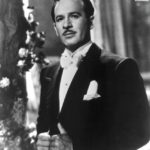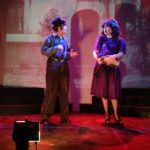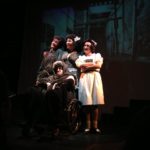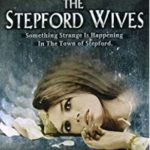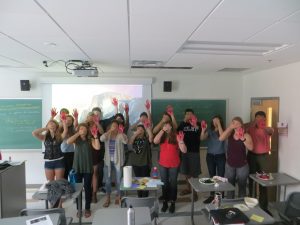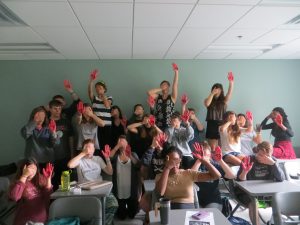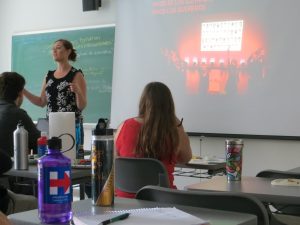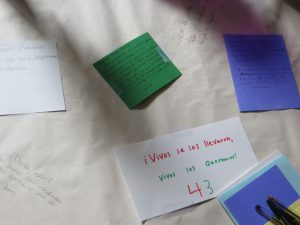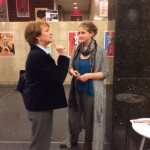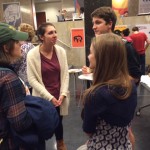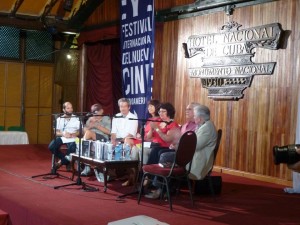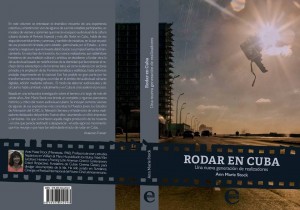Read Dr. Carlos Rivera Santana’s interview with Alicia Díaz and Patricia Herrera, artists and activists and organizers of the performance/dance film “Entre Puerto Rico y Richmond”, which was presented at the College of William & Mary’s Muscarelle Museum in November 2021. The article is co-authored by Dr. Rivera Santana, Whitney Ledesma and Malvika Shrimali (of Hispanic Studies). It is published in Intervenxions, an online publication of The Latinx Project (https://www.latinxproject.nyu.edu/intervenxions/entre-puerto-rico-y-richmond-a-conversation-on-embodied-decolonial-creation-with-alicia-daz-amp-patricia-herrera).
Category: News: Hispanic Studies
Dr. Rebeca Pineda Burgos was hired as an Visiting Assistant Professor of Hispanic Studies in the Fall of 2021. We recently had some time to catch up with Dr. Pineda Burgos to find out about her work and her experiences in Williamsburg.
What are you teaching this year?
In the fall, I taught Combined Beginning Spanish and Topics in Advanced Spanish Composition and Grammar. In the Spring, I’ll be teaching Advanced Spanish Composition and Grammar y Culturas de in(ex)clusión en el mundo hispánico.
Tell us more about your research and what are you working on right now.
My research focuses on how contemporary cultural objects such as novels, film and visual art can be used to understand sociopolitical reality. My dissertation focused on how these objects reflected, interpreted and contested chavismo and Venezuelan sociopolitics. One of the most interesting things about this work is how cultural productions can not only reflect or contest realities, but produce new narratives and ways of being that are not pushed as part of dominant politico-ideological discourses in a place.
Right now I’m preparing conference presentations and proposals. As I move forward in my work, I find myself drawn to contemporary philosophy and ethics, and how phenomenological experience creates contested readings of ideologized traditions of believing and knowing.
What would be your dream class to teach and why?
A dream course would be one based on my research where I can develop an exploration of philosophical narratives through contemporary cultural artefacts. The class would be a practice and exploration of how to use cultural productions to “read” these narratives through the artefacts, including film and plastic arts.
Finally: How have your first few months at William & Mary been?
Great! It’s a big change from New York City, and especially New York under COVID. What stood out first was the community of colleagues in the Hispanic Studies Program and in the Modern Languages and Literatures Department. They have been so welcoming and “warm” is the word that comes most to mind. Also the students. They are super engaged, intelligent and interested. For many of my students this semester, this was their first experience taking a face to face university class (due to COVID), and they were nervous. In some ways, we were in a similar situation, since I was new at W&M this semester too. (these were my first classes at W&M too). There were other new colleagues in the program with me this semester, and having other colleagues who are new here too has helped us to become fast friends.
 During the 12th and 13th centuries, Toledo, Spain, became a neuralgic center for the production and dissemination of knowledge in Europe. As part of what came to be known as the Renaissance of the 12th Century, the collaborative translations carried out in Toledo by Jewish scholars, Mozarabic Toledans (Arabic-speaking Christians), and Christian intellectuals from all over Europe made available to the Latin West key texts by Hippocrates, Aristotle, Euclid, Galen, and Ptolemy, among others, that would make possible the foundational works by Albertus Magnus, Thomas Aquinas and Roger Bacon.
During the 12th and 13th centuries, Toledo, Spain, became a neuralgic center for the production and dissemination of knowledge in Europe. As part of what came to be known as the Renaissance of the 12th Century, the collaborative translations carried out in Toledo by Jewish scholars, Mozarabic Toledans (Arabic-speaking Christians), and Christian intellectuals from all over Europe made available to the Latin West key texts by Hippocrates, Aristotle, Euclid, Galen, and Ptolemy, among others, that would make possible the foundational works by Albertus Magnus, Thomas Aquinas and Roger Bacon.
 While the collaborative translations in medieval Toledo fundamentally changed the Latin West, the translations of Western classics into Mandarin carried out by Lin Shu (1852-1924) and his “factory of writing” transformed modern Chinese culture and offered new ways to imagine Chinese national identity. Lin Shu, however, represents the case of a translator who was not versed in other languages, and hence depended on over 20 different bilingual assistants. This collaborative system allowed Lin Shu’s “factory of writing” to offer Chinese versions of almost two hundred classics of Western fiction, including Uncle Tom’s Cabin (1852), Oliver Twist (1837-9), and, via an English translation, of Cervantes’ Don Quijote (1605).
While the collaborative translations in medieval Toledo fundamentally changed the Latin West, the translations of Western classics into Mandarin carried out by Lin Shu (1852-1924) and his “factory of writing” transformed modern Chinese culture and offered new ways to imagine Chinese national identity. Lin Shu, however, represents the case of a translator who was not versed in other languages, and hence depended on over 20 different bilingual assistants. This collaborative system allowed Lin Shu’s “factory of writing” to offer Chinese versions of almost two hundred classics of Western fiction, including Uncle Tom’s Cabin (1852), Oliver Twist (1837-9), and, via an English translation, of Cervantes’ Don Quijote (1605).
 Lin Shu’s Don Quijote was a great editorial success. Recently, the Instituto Cervantes published a Spanish rendering of Lin Shu’s version. Given the occasion, BBC Mundo interviewed Prof. Michael Gibbs Hill, specialist in Lin Shu’s work, and author of Lin Shu, Inc.: Translation and the Making of Modern Chinese Culture (Oxford UP, 2013). Prof. Hill explains that Lin Shu’s collaborative methodology was not uncommon at the time, and that it allowed him to make authors like Dickens and Tolstoi available to Chinese readers. Lin Shu’s “factory” was so efficient that it produced around 180 titles over 20 years. And while the Quijote translation seems to be rather ‘faithful,’ Prof. Hill explains that Lin Shu would sometimes introduce deliberate changes. For instance, his version of Dickens’ Oliver Twist underscores a very negative image of England in order to suggest that, by identifying its ailments, literature could transform and better a society. Despite his success, Lin Shu eventually came to be seen as too commercial, and too conservative by his younger readers.
Lin Shu’s Don Quijote was a great editorial success. Recently, the Instituto Cervantes published a Spanish rendering of Lin Shu’s version. Given the occasion, BBC Mundo interviewed Prof. Michael Gibbs Hill, specialist in Lin Shu’s work, and author of Lin Shu, Inc.: Translation and the Making of Modern Chinese Culture (Oxford UP, 2013). Prof. Hill explains that Lin Shu’s collaborative methodology was not uncommon at the time, and that it allowed him to make authors like Dickens and Tolstoi available to Chinese readers. Lin Shu’s “factory” was so efficient that it produced around 180 titles over 20 years. And while the Quijote translation seems to be rather ‘faithful,’ Prof. Hill explains that Lin Shu would sometimes introduce deliberate changes. For instance, his version of Dickens’ Oliver Twist underscores a very negative image of England in order to suggest that, by identifying its ailments, literature could transform and better a society. Despite his success, Lin Shu eventually came to be seen as too commercial, and too conservative by his younger readers.
The full note from BBC Mundo is available in Spanish.
Prof. Hill has published translations of Ge Zhaoguang’s He wei Zhongguo?, and of the introduction to Wang Hui’s Xiandai Zhongguo sixiangde xingqi.
Research team members Elena Calderone, Haley Conde and Isabel Delaney conducted professional interviews with stakeholders linked to Latin American art and the University. This is part of an ongoing project to transform the walls of campuses nationwide. In March 2021 Haley Conde and Regina Root co-presented preliminary findings to the Middle Atlantic Council of Latin American Studies at a conference on “Life, Struggle and Expression in Uncertain Times” at the College of New Jersey. They have also co-authored an article titled “Roser Bru, Human Rights and the University”. Other students have engaged other facets of this initiative over time so stay tuned!
This year’s MLL Outstanding Achievement Award in Hispanic Studies is awarded to Max Minogue and Beau Nardo. This award acknowledges an outstanding graduating Hispanic Studies major with a strong record of achievements in the program.
Max has been a Teaching Assistant in the Hispanic Studies program and also studies Portuguese and Italian. After completing our Human Rights-oriented study abroad program in La Plata Argentina, Max has been recruited over several semesters to work with Profs. Tandeciarz and Konefal in the most selective and coveted W&M internship with the National Security Archive, during which time Max helped analyze declassified material related precisely to the military dictatorships in Argentina.
 Max says, “I’m so grateful to receive this award after having already gotten so much from Modern Languages and specifically the Hispanic Studies department. No tengo palabras ni en inglés ni en español para expresar mi gratitud.” Max plans to teach English abroad for several years after graduating.
Max says, “I’m so grateful to receive this award after having already gotten so much from Modern Languages and specifically the Hispanic Studies department. No tengo palabras ni en inglés ni en español para expresar mi gratitud.” Max plans to teach English abroad for several years after graduating.
 After graduating, Beau begins a graduate program in the fall at La Universidad Carlos III de Madrid working towards a Máster en Geopolítica y Estudios Estratégicos (Master in Geopolitics and Strategic Studies). There, he hopes to find employment in the field of diplomacy and international relations.
After graduating, Beau begins a graduate program in the fall at La Universidad Carlos III de Madrid working towards a Máster en Geopolítica y Estudios Estratégicos (Master in Geopolitics and Strategic Studies). There, he hopes to find employment in the field of diplomacy and international relations.
Beau has commented, “I am truly humbled that such an esteemed group of professors would choose me for this honor… I am still trying to find the words that will express my full gratitude to the HISP Department.
Hispanic Studies is grateful for the contributions of students like Max and Beau. We thank you for everything you have put into your studies and our program!
The Howard M. Fraser Award has been awarded to Caroline Brown and Cristina Sherer. The award is in memory of Prof. Howard Fraser, a distinguished specialist in Latin American Literature and culture and is given to a graduating Hispanic Studies major who has made significant achievements in research and service.
 Caroline says, “I was truly honored to be selected for this award and I’m very grateful for it.” The photo of Caroline is from her semester abroad in La Plata. It was taken on a weekend hiking trip to El Calafate, to which she traveled with her dear friend and fellow Hispanic Studies major Hailey Ramsey (Class of 2019). Caroline plans on getting her master’s in ESL at UVA. After certified to teach K-6 general education K-12 ESL, she will pursue opportunities teaching in elementary school in either a general education or ESL.
Caroline says, “I was truly honored to be selected for this award and I’m very grateful for it.” The photo of Caroline is from her semester abroad in La Plata. It was taken on a weekend hiking trip to El Calafate, to which she traveled with her dear friend and fellow Hispanic Studies major Hailey Ramsey (Class of 2019). Caroline plans on getting her master’s in ESL at UVA. After certified to teach K-6 general education K-12 ESL, she will pursue opportunities teaching in elementary school in either a general education or ESL.
A diligent and passionate student, Cristina completed an Honors Thesis that examined the recognition and use of inclusive language among Spanish speakers. Her research culminated in recommendations about implementing inclusive language for our own Hispanic Studies program. Cristina will begin a graduate program in ESL & Bilingual Education at the W&M School of Education in June. She would like to be certified both ESL and Spanish at stay in the Virginia area to teach after her one-year program of study. Cristina gives her “profuse thanks to the department for [her] many opportunities to do the work.”
Hispanic Studies is so proud of Cristina and Caroline’s work. Congratulations!
The Merritt Cox Award has been awarded to Julia Tripodi and Mackenzie Krol.
This award commemorates Prof. Merritt Cox, a distinguished specialist in 18th century Spain. It is awarded to a graduating Hispanic Studies major who has achieved an outstanding level of academic excellence in Hispanic Studies, and will pursue a graduate degree in the field. Julia is interested in teaching ESL and Spanish in the future.
 Professor Cate-Aries recounts, “I remember with pride Julia’s field research project conducted while studying with our summer program in Cádiz, Spain. Because of her interest in educational issues related to equity for all students, teachers’ rights, and social activism, she chose to research current street protests in Spain related to citizens’ response to unpopular government measures to eliminate teaching positions in public education, increase work hours and the student-teacher ratio. She chose as her case study the group Marea Verde (The Green Tide), a nation-wide coalition comprised by educators, parents, and community members who champion quality public education against increasing cuts that compromise local and regional educational objectives. She not only was able to observe a massive demonstration in Cádiz in May 2019. She was able to ground her study of teachers’ complaints and activism within a larger context of the robust social movements more broadly in 21stcentury Spain. Her own future as a classroom teacher, after pursuing a Master’s degree at UVA in the fall, is incredibly promising.”
Professor Cate-Aries recounts, “I remember with pride Julia’s field research project conducted while studying with our summer program in Cádiz, Spain. Because of her interest in educational issues related to equity for all students, teachers’ rights, and social activism, she chose to research current street protests in Spain related to citizens’ response to unpopular government measures to eliminate teaching positions in public education, increase work hours and the student-teacher ratio. She chose as her case study the group Marea Verde (The Green Tide), a nation-wide coalition comprised by educators, parents, and community members who champion quality public education against increasing cuts that compromise local and regional educational objectives. She not only was able to observe a massive demonstration in Cádiz in May 2019. She was able to ground her study of teachers’ complaints and activism within a larger context of the robust social movements more broadly in 21stcentury Spain. Her own future as a classroom teacher, after pursuing a Master’s degree at UVA in the fall, is incredibly promising.”
Mackenzie will be attending Wake Forest University in the fall for an MA. She says, “I feel extremely honored to receive this award. I am excited to pursue my masters in Translation and Interpreting Studies, and am grateful to have support from the WM Hispanic Studies Department!
Prof. Cate-Aries recalls, “I remember her final class project with particular admiration. She had access to a rare mimeographed archival document entitled “Cursillo de Capacitación Social”, a November 1966 training and educational manual for indigenous activists in the rural, indigenous community of Malacatancito, Guatemala. Mackenzie thoroughly researched the place of these widespread “cursillos/mini-courses” in the origins of the Latin American liberation theology movement, citing the 1966 document’s genesis in the climate of Vatican II (1962-1965) and the ongoing Latin American Catholic Church debates that spawned the Latin American Episcopal Council’s (CELAM) manifestos. Mackenzie’s translation provides historians and cultural studies practitioners a valuable primary text that succinctly overviews the most pressing socio-economic concerns—like homelessness, lack of health care, illiteracy rates, the necessity for more equitable agrarian land reform—that face marginalized communities and the faith groups who are committed to serving them. It was a top-notch piece of translation research.”
Congratulations, Mackenzie and Julia, for all your hard work!
Sharon Philpott, class of 1985 and Accounting major, receives the 2021 W&M Alumni Medallion.
 In 2010, Sharon generously helped establish the Philpott-Perez Faculty-Student Research Endowment, which has since that time permitted the undertaking of several initiatives by Hispanic Studies faculty in support of undergraduate research. With her support, students have been able to tra
In 2010, Sharon generously helped establish the Philpott-Perez Faculty-Student Research Endowment, which has since that time permitted the undertaking of several initiatives by Hispanic Studies faculty in support of undergraduate research. With her support, students have been able to tra vel abroad and conduct research abroad in Guatemala (with Prof. Tandeciarz), to the Basque country (with Prof. Buck) and to Madrid, Spain as part of a freshman seminar during Spring 2018 (with Prof. Cate-Aries), among other places.
vel abroad and conduct research abroad in Guatemala (with Prof. Tandeciarz), to the Basque country (with Prof. Buck) and to Madrid, Spain as part of a freshman seminar during Spring 2018 (with Prof. Cate-Aries), among other places.
Mary Trotto, one of the graduating students who travelled during spring 2018 offered some reflections on the experiences that the Philpott-Perez Endowment helped make a reality:

“I still think of the Imagina Madrid seminar’s trip to Spain as the greatest opportunity I had at William and Mary! This trip was the first opportunity I ever had to leave the U.S., and its accessibility in helping students to experience a trip to another country was a formative part of my becoming a Hispanic Studies major and pursuing a research project on Francoism in Cádiz the following summer. This trip was truly remarkable in how it let us students experience firsthand what we had been reading about all semester, and it really opened my eyes to the benefits of international experiences and studying another country’s history and culture.”
Additional ways that Sharon’s contribution has supported student research and international experiences can be found here: http://globalvoices.wm.edu/?s=philpott
The full story of Sharon Philpott’s award reception is here: https://www.wm.edu/news/stories/2021/meet-the-2021-alumni-medallion-recipients.php
More about Sharon can be viewed here: https://www.youtube.com/watch?v=sSI_fZ9wRW4
Most of us do not think of the humanities when they hear the word “lab”. A research lab conjures up images of bunsen burners and beakers, microscopes and white coats, and perhaps various signs warning of fire hazards and chemical spills posted inside and out. But those who attended the first of two MLL Undergraduate Research Showcases, part of W&M’s “April is Undergraduate Research Month,” could hear all about labs in Modern Languages and Literatures. Paul Vierthaler, Assistant Professor in Chinese Studies, and Rachel Varra, Assistant Professor in Hispanic Studies and in Linguistics, gave us an overview of what their labs look like, and of the kind of work students do in those labs. Like any lab, there is a lot of equipment: computers that are more powerful than your regular laptop, specialized software, recording devices, but also: mini-fridges and sofas. Students spend a lot of time in these spaces. Much of the w ork they do is inherently collaborative – a somewhat unusual approach to research in the humanities. Prof. Vierthaler’s students spoke about bringing ideas for data processing to him and developing and workshopping apps; another group of students is creating a game to help raise awareness of human trafficking. Prof. Varra’s students are interviewing Spanish speakers in the community and learning how to transcribe recordings and compile a corpus. The lively discussion and the numerous questions from the audience prove that interdisciplinary work – with Data Science and with Linguistics in these cases – and collaborative forms of research are of great interest to students.
ork they do is inherently collaborative – a somewhat unusual approach to research in the humanities. Prof. Vierthaler’s students spoke about bringing ideas for data processing to him and developing and workshopping apps; another group of students is creating a game to help raise awareness of human trafficking. Prof. Varra’s students are interviewing Spanish speakers in the community and learning how to transcribe recordings and compile a corpus. The lively discussion and the numerous questions from the audience prove that interdisciplinary work – with Data Science and with Linguistics in these cases – and collaborative forms of research are of great interest to students.

The largest government-to-government declassification project in US history began under U.S. President Barack Obama in March 2016 and was continued by President Donald J. Trump. But W&M students and faculty had been engaged in related archival work on campus, in Washington, D.C., and in Argentina for over a decade under Associate Professor of Hispanic Studies and Latin American Studies Silvia Tandeciarz, Associate Professor of History and Latin American Studies Betsy Konefal, and National Security Archive analyst Carlos Osorio.

Throughout that time, students interning with the National Security Archive in D.C. or participating in W&M’s La Plata study-abroad program have sifted through both U.S. and Argentinian documents to learn more about what happened in Argentina during the dictatorship and what role the U.S. may have played. The Argentinian government has already used some of that work in its prosecution of accused perpetrators of human rights abuses. This latest publication offers insight into what the US government knew about the coming coup–the story of a coup foretold. The publication was covered in all the main news outlets in Argentina and was paired with a Briefing Book published on the NSArchive website the day prior to the 45th anniversary of the coup.

 You can find more information on our Study Abroad program in La Plata here, and a heartfelt testimony from a participating student here.
You can find more information on our Study Abroad program in La Plata here, and a heartfelt testimony from a participating student here.
Other stories about the W&M internship with the National Security Archive can be found here.
In the Spring/Summer 2021 Issue of the Newsletter of the Muscarelle Museum of Art, Mackenzie Krol (’21) reflects on her experiences on a William & Mary Study Away to Guatemala during the fall 2018 semester, and her exposure to Daniel Hernández- Salazar’s moving art and how it all came together during the class “Beyond Recollection” taught by Betsy Konefal (History) and Silvia Tandeciarz (Hispanic Studies). Read the full Newsletter here.
 Professor of Hispanic Studies Regina Root, her students, and Director of Collections & Exhibitions Melissa Parris mounted three separate installations of paintings at the Muscarelle Museum of Art between 2017 and 2018. The first was an unofficial installation in the Herman Graphic Art Room at the Muscarelle, which allowed Root’s students to study them. After a semester of study, the paintings were installed in the Sadler center and then moved to the second floor of the Earl Gregg Swem Library where they are currently on view. Read more about it at https://muscarelle.wm.edu/wp-content/uploads/2021/02/2021-Spring-Summer-Newsletter_web.pdf.
Professor of Hispanic Studies Regina Root, her students, and Director of Collections & Exhibitions Melissa Parris mounted three separate installations of paintings at the Muscarelle Museum of Art between 2017 and 2018. The first was an unofficial installation in the Herman Graphic Art Room at the Muscarelle, which allowed Root’s students to study them. After a semester of study, the paintings were installed in the Sadler center and then moved to the second floor of the Earl Gregg Swem Library where they are currently on view. Read more about it at https://muscarelle.wm.edu/wp-content/uploads/2021/02/2021-Spring-Summer-Newsletter_web.pdf.
 This fall, we had the chance to catch up with a new professor in the Department of Modern Languages & Literatures: Dr. Carlos Santana Rivera. Dr. Rivera is a U.S.-Puerto Rico native who has been
This fall, we had the chance to catch up with a new professor in the Department of Modern Languages & Literatures: Dr. Carlos Santana Rivera. Dr. Rivera is a U.S.-Puerto Rico native who has been
working for the last several years at the prestigious Center for Puerto Rican Studies in New York. We asked him about his first semester here at William & Mary, his research, his classes and his hopes for future work on campus and in his field.
How has it been for you W&M this semester?
I have been really happy to be at W&M because W&M and the Department of Modern Languages and Literatures values innovative ideas in teaching and research. For instance, last semester I was teaching two courses on Indigenous worldview perspectives, with a focus on Indigenous philosophy and culture. And the fact that this course even exists and receives institutional support is wonderful because, to start with, it is not common for such a course to be taught outside of Anthropology. Second, because in some circles it is a radical idea that there exists such a thing as ‘indigenous philosophy’. But to put backing behind exposing these ideas to students in the classroom, and of course in my research, is amazing.
What were the courses you were you teaching last semester?
I was teaching two versions of the same topic. The first was a COLL 150, “Indigenous World Cultures”. That version of the class was writing-heavy. It was an examination of international indigenous worldview perspectives focusing on Latin America and the Caribbean. Well, to be fair, it’s an approach to indigenous perspectives, because what those perspectives and philosophies are, cannot be taught per se, if anything passed on. The other class I taught was HISP 390, “Global Indigenous Cultures”. It was focused on Indigenous philosophy (heavier in content) and its expressions in cultural production. We looked at how indigeneity has been represented in LA and Caribbean cultural production for hundreds of years through the examination of art, a novel, oral history, essays, music and so on.
What were some stand-out moments of your classes?
One positive thing about teaching the classes was that, in teaching a portion of the course online this semester (mix modality), I was able to invite three guest speakers (and this fulfilled those 5 extra hours we had to add to our syllabi. Two were from the Caribbean (from Puerto Rico) and one from Australia. The first person was a prominent writer (Eduardo Lalo, and the novel students had to read was Historia Yuké). The novel was about the significance of El Yunque Rainforest to Indigenous people in Puerto Rico (Borikén) throughout history. So, the students read Lalo’s book and then had a conversation with him. It was like a book club that led to meeting the author. And it was a great event because it started not with Eduardo Lalo speaking, but with students asking questions(you can see a video of this “Conversatorio with Eduardo Lalo”). The second speaker was the Indigenous activist Pluma Bárbara. This was also a great experience and students were really grateful for the grassroot political work that she does and both of our guest were really impressed with our Hispanic studies students and how engaged in the work our students were. These conversations were in Spanish. The third speaker was an Indigenous Australian author and he spoke about cultural appropriation and the craft of writing. After that third one, students had to produce something creative (poetry, an op-ed, or a narrative story) so they could have concrete questions about writing and navigating cultural appropriation. I have ideas about how to adjust aspects of the course in the future, but overall, I’d say students appreciated it especially the diverse array of guest speakers. In the future, I’ve considered having a poetry slam be the culmination of such a course, something I’ve done in the past and it works beautifully as a celebratory ending to the semester.
What is the focus of your research?
The area I work in is called Decolonial Aesthetics (DA) and Indigenous studies. DA isn’t a new thing. The phrase was coined some time ago by LA theorists. I’m building on their framework by analyzing works and speaking to the artists that I think are doing the work to recast indigeneity and blackness and the varying complexities of identity, history, nationalism, race and racism today, but beginning from the emotions provoked in by aesthetics.
In my PhD thesis and more extensively on my book Archaology of Colonisation: From Aesthetics to Biopolitics, I looked at the way that colonization, and its main tools (the discourses of race and racism), took root in the Caribbean and then in Latin America. I begin with the premise that racism and concepts of race are initially created not through written discourse or history, but through aesthetics, i.e. imagery including art. From a simple perspective, 80 or 90 percent of Europe during the time of colonization could not read. But you have to be able to conceptualize someone before you can justify or rationalize behaviors toward them. So, imagery had a principal role in doing this and in disseminating, perceptions, affectations, knowledge, and discourses at large about people. So, yes, I looked at the way that colonization utilized imagery in the first 100 years (1492-1599) to depict Indigenous and Black peoples.
I focus on aesthetics because we have done good work in cultural studies so far in examining the construction of race and in challenging colonial narratives in history, anthropology and so on. We have not done enough work on this using visual imagery. In other words, we conceptualize racism very rationally, but I think the heart of this work on (de)colonization is affective, and that the affective is efficiently generated aesthetically, through imagery. In other words, I think that concepts of race began in the way that Black and Indigenous peoples have been depicted visually and affectively: not in terms of beauty, but in terms of ugliness and monstrosity. In order to justify the atrocities of colonization, they had to be founded on a dehumanization of its victims, casting the ‘other’ from a frame of “the monstrous” and speak to the viewer’s emotions.
My current work also focuses on the aesthetic. But instead of using it to understand how race and racism were constructed, I am examining how the aesthetic is used to contest race and racism and how it is used to construct counternarratives to the ongoing problem of colonization. I think there is more work to be done in the realm of the affective in order to counteract that aspect of race and racism, that part that has to do with the mobilization of emotions, about conceptualizations of beauty and ugliness, and art has a lot to say about that.
What classes will you teach next semester?
I am teaching Introduction to Hispanic Studies (HISP 240) with Professor Terukina. I’m also teaching Arte y Descolonización en Latino America (HISP 250) which looks at the way that art in all of its manifestations (performance art, muralism, street art, contemporary art) has had a role in expressing anti-colonial messages. In the class, we aren’t romanticizing the art. We are also looking at it critically too to see how art produced during colonial times depicted Indigenous peoples and peoples of color at large, and to see how imagery contributed to crafting and constructing racism and the concept of race. I’m really excited about the fact that we are having at least one invited speaker. She is an artist and an expert in mural and street art in Puerto Rico and the Caribbean.
What would be a dream course you would like to teach?
I would do a course that has a study-abroad component that looked at formations of identity, race and colonization in art in Latin America and the Caribbean, focused in Puerto Rico. We would go to Puerto Rico and visit museums, artist workshops, galleries, festivals and other off-the-beaten track places (I know the island really well). It would be like a literal and figurative road trip, living an experience of history and culture through the art. We would be traveling around the island, but also the artists would take us through the conceptual trajectory of their individual pieces and their collective productions as well.
This fall, Hispanic Studies’ newest faculty member, Dr. Carlos Rivera,  organized a conversation with the author and indigenist activist Eduardo Lalo for his students of HISP390. Students first read his novel Historia de Yuke (El Yunque rain forest in Puerto Rico) and then had the opportunity to ask the author about his book. A video of the conversation can be viewed here: https://wmedu.hosted.panopto.com/Panopto/Pages/Viewer.aspx?id=fa2a8f75-8fb8-48ea-90c5-ac47016a251c
organized a conversation with the author and indigenist activist Eduardo Lalo for his students of HISP390. Students first read his novel Historia de Yuke (El Yunque rain forest in Puerto Rico) and then had the opportunity to ask the author about his book. A video of the conversation can be viewed here: https://wmedu.hosted.panopto.com/Panopto/Pages/Viewer.aspx?id=fa2a8f75-8fb8-48ea-90c5-ac47016a251c
 In Dr. Gaytan Cuesta’s Fall 2020 class “Zombies, Ghosts and the End of the World in Latin American Film and New Audiovisual Media” students created video-essays. These are stored at the Media Center and can also be seen on the YouTube channel “Butaca Abierta” at: https://www.youtube.com/channel/UCZYh0k1oE2sHh6kMK32yFlA
In Dr. Gaytan Cuesta’s Fall 2020 class “Zombies, Ghosts and the End of the World in Latin American Film and New Audiovisual Media” students created video-essays. These are stored at the Media Center and can also be seen on the YouTube channel “Butaca Abierta” at: https://www.youtube.com/channel/UCZYh0k1oE2sHh6kMK32yFlA
 In the class of Elementary Spanish (HISP 103), Doctora Gaytán Cuesta organized a Gost Tour in Spanish with her students! The students had costumes and gave a complete tour of Colonial Williasburg’s most haunted places, including the Wren Building, Tucker, the Sunken Gardens, Kimbal Theater, The WytheHouse, the Public Gaol and the Market House. They learned about the legends of Lucinda, the pirate Blackbeard and t
In the class of Elementary Spanish (HISP 103), Doctora Gaytán Cuesta organized a Gost Tour in Spanish with her students! The students had costumes and gave a complete tour of Colonial Williasburg’s most haunted places, including the Wren Building, Tucker, the Sunken Gardens, Kimbal Theater, The WytheHouse, the Public Gaol and the Market House. They learned about the legends of Lucinda, the pirate Blackbeard and t
he ghosts of Bruton Parish.
Following socio-distancing measures, those who couldn’t attend in person did a Flipgrid assignment. See the videos here:https://flipgrid.com/7b7183
Professor Emeritus of Hispanic Studies George Greenia, recently received a from the Virginia General Assembly, introduced by State Senator Monty Mason. What makes this award extra special is the fact that Monty Mason was once Prof. Greenia’s student in 1985-86 and took Spanish classes with him here at W&M!
Prof. Greenia joined the Modern Languages and Literatures Department in 1982 after receiving his PhD from the University of Michigan. One of his areas of expertise is pilgrimage studies, and at W&M he has led students on many Summer Study Abroad trips to Santiago de Compostela, the famed pilgrimage route. But Prof. Greenia’s activities don’t stop there. The Commendation lists, among others, these achievements:
“WHEREAS, a tireless advocate of LGBT students at The College of William and Mary, George Greenia spent many years as the faculty facilitator of the Gay Student Support Group; in 2006, the William and Mary Gay and Lesbian Alumni/ae Association presented him with the Founders’ Cup for Outstanding Lifetime Service to the Gay and Lesbian members of The College of William and Mary Community; and WHEREAS, in 2007, George Greenia’s promotion of Spanish history and culture saw him knighted by order of King Carlos I of Spain and awarded the Order of Isabel the Catholic, one of Spain’s highest honors; and WHEREAS, George Greenia’s many other recognitions include a lifetime achievement award from American Pilgrims on the Camino, and the William & Mary Diversity Leadership Award from the Office of Diversity and Equal Opportunity; a longtime supporter of the Phi Beta Kappa Society, he is the recipient of its President’s Award and Judith F. Krug Medal …”
Congratulations, Prof. Greenia!
This spring, Professor of Hispanic Studies Silvia Tandeciarz was appointed Chancellor Professor of Modern Languages and Literatures. Prof. Tandeciarz has served as Chair of Modern Languages and Literatures for several years, and is also part of many initiatives on campus. She is the founder of the William & Mary National Security Archive Project and the author, most recently, of Citizens of Memory: Affect, Representation, and Human Rights in Postdictatorship Argentina (2017). Congratulations!
In this inaugural piece in our new Hispanic Studies series for Global Voices—“Spotlight on Alumni Careers and the Hispanic Studies Major”, we profile five of our alumni from graduating classes spanning an almost two decade period. All alumni are either practicing medical doctors, medical school students, or W&M graduates accepted into med school. All share reflections about the relevance and significance of their education and training as Hispanic Studies major, in terms of preparation for medical school and the practice of medicine more generally.
Philip Grotz
William & Mary Class of 2020
UVA School of Medicine Class of 2024
 Being a pre-med, I was often asked why I was so masochistic to take up a major in Hispanic Studies on top of my primary major in Neuroscience. In truth, my time in Hispanic Studies was anything but painful. Rather, I feel like all of my best college experiences came as a result of my involvement in the Hispanic Studies program, from studying jazz-flamenco music while abroad in Cádiz, Spain, to working as a medical interpreter on the Eastern Shore of Virginia. To me, pursuing this degree was never a distraction from my pre-med studies, but rather a unique way to pursue my interests that I believe made me a much stronger medical school applicant than I would have been otherwise. The type of student that med schools look for is exactly what my Hispanic Studies education helped me to become: a student who is unique and will contribute to community diversity, who understands the issues impacting inequality of care, and who has compassion for all people. When I worked as a Spanish-speaking medical interpreter, it was important to understand the systemic problems preventing non-English speakers from receiving healthcare in order to be an advocate for those patients when the system treats them unfairly.
Being a pre-med, I was often asked why I was so masochistic to take up a major in Hispanic Studies on top of my primary major in Neuroscience. In truth, my time in Hispanic Studies was anything but painful. Rather, I feel like all of my best college experiences came as a result of my involvement in the Hispanic Studies program, from studying jazz-flamenco music while abroad in Cádiz, Spain, to working as a medical interpreter on the Eastern Shore of Virginia. To me, pursuing this degree was never a distraction from my pre-med studies, but rather a unique way to pursue my interests that I believe made me a much stronger medical school applicant than I would have been otherwise. The type of student that med schools look for is exactly what my Hispanic Studies education helped me to become: a student who is unique and will contribute to community diversity, who understands the issues impacting inequality of care, and who has compassion for all people. When I worked as a Spanish-speaking medical interpreter, it was important to understand the systemic problems preventing non-English speakers from receiving healthcare in order to be an advocate for those patients when the system treats them unfairly.
In general, I feel like I gained a significant amount of confidence as this course of study made me come to terms with new situations. These include taking solo trips to jazz performances while studying abroad, thinking on my feet to communicate with individuals who spoke unfamiliar dialects while I was interpreting, and most recently, travelling to Cuba just out of my own personal interest. I cannot imagine what my education would have been like without this degree. Everything I learned from my Neuroscience major I will eventually be taught again, but the way that Hispanic Studies has introduced me to other perspectives, improved my interpersonal skills, and strengthened my moral convictions will never be replaced. Granted, my double-major might have made me a little busier than I would have been otherwise, but I’m sure it only served to better prepare me for the *actually* busy times, which are yet to come.
Maren Leibowitz, MD
William &Mary Class of 2015
University of Virginia School of Medicine Class of 2019
Emergency Medicine Resident at Northwestern Memorial Hospital in Chicago, IL
 It has never been more apparent how crucial my major in Hispanic Studies has been to my development as a doctor than during the 2020 COVID-9 pandemic. As an emergency medicine resident physician training in downtown Chicago, I interact with Spanish-speaking patients and their families every day. In non-pandemic times, navigating fears and complex medical situations in English is hard; navigating those same thoughts and feelings in Spanish is even harder. Add in the uncertainty of a pandemic when family members are not allowed to accompany their loved ones into the hospital, the task seems almost impossible. My Hispanic Studies classes and experiences at William & Mary gave me the confidence to speak Spanish knowing that I am understood by my patients and equipped me with the knowledge and tools to practice culturally humble and sensitive medicine. I am also a firm believer that having a broad set of interests leads to a more balanced physician. With my Hispanic Studies background, I sought out opportunities in medical school to get involved with my local Latino community and currently am working on building culturally relevant education platforms for training physicians. Who I am becoming as a doctor is in large part due to my choice to pursue a Hispanic Studies major at W&M. It has provided me much needed skills and perspectives that I am thankful to have every day I step into the hospital.
It has never been more apparent how crucial my major in Hispanic Studies has been to my development as a doctor than during the 2020 COVID-9 pandemic. As an emergency medicine resident physician training in downtown Chicago, I interact with Spanish-speaking patients and their families every day. In non-pandemic times, navigating fears and complex medical situations in English is hard; navigating those same thoughts and feelings in Spanish is even harder. Add in the uncertainty of a pandemic when family members are not allowed to accompany their loved ones into the hospital, the task seems almost impossible. My Hispanic Studies classes and experiences at William & Mary gave me the confidence to speak Spanish knowing that I am understood by my patients and equipped me with the knowledge and tools to practice culturally humble and sensitive medicine. I am also a firm believer that having a broad set of interests leads to a more balanced physician. With my Hispanic Studies background, I sought out opportunities in medical school to get involved with my local Latino community and currently am working on building culturally relevant education platforms for training physicians. Who I am becoming as a doctor is in large part due to my choice to pursue a Hispanic Studies major at W&M. It has provided me much needed skills and perspectives that I am thankful to have every day I step into the hospital.
Ethan Pearlstein, MD
William and Mary Class of 2015
Robert Wood Johnson Medical School Rutgers University, Class of 2019, with Distinction in Global Health
Resident Physician, Internal Medicine, Brown University in Providence, RI
 Often, college students interested in pursuing a career in medicine are advised and feel compelled to pursue an academic major in the sciences in preparation for medical school. While completion of all necessary pre-medical requirements is essential, in our increasingly diverse society, a Hispanic Studies degree educates students in cultural competencies and Spanish fluency. Such training prepares extremely strong medical school applicants. In a sea of applications from chemistry and biology majors, I feel that my Hispanic Studies background and senior honors thesis on the political abuse of psychiatry in Spain set me apart. On medical school and residency interviews, my Hispanic Studies research and fluency in Spanish were the focus of conversation. The fact that I did not major in the sciences was never even discussed. The pre-medical requirements at William and Mary provided me with a strong foundation to succeed in medical school without the need for a science major.
Often, college students interested in pursuing a career in medicine are advised and feel compelled to pursue an academic major in the sciences in preparation for medical school. While completion of all necessary pre-medical requirements is essential, in our increasingly diverse society, a Hispanic Studies degree educates students in cultural competencies and Spanish fluency. Such training prepares extremely strong medical school applicants. In a sea of applications from chemistry and biology majors, I feel that my Hispanic Studies background and senior honors thesis on the political abuse of psychiatry in Spain set me apart. On medical school and residency interviews, my Hispanic Studies research and fluency in Spanish were the focus of conversation. The fact that I did not major in the sciences was never even discussed. The pre-medical requirements at William and Mary provided me with a strong foundation to succeed in medical school without the need for a science major.
On the hospital floors in medical school and residency, I was actively sought out by my supervising physicians to interpret for Spanish speaking patients, or to help them better understand the cultural practices of our diverse patient population. While in medical school, I was able to take part in a local free clinic for the underserved and volunteered as both a Spanish interpreter and student doctor for our patients. Often, medical students and fellow residents express to me their regret that they did not seriously consider a major in foreign language. Simply put, my decision to pursue a major in Hispanic Studies is among my best career decisions to date. It certainly gave me an edge when applying for medical school and residency, offering a skillset to these programs that many other students and residents do not have. It allows me to communicate on a daily basis with an entire patient population in their native tongue, helping to alleviate their concerns related to language barriers and picking up cues that are often lost in translation. I am indebted to the Hispanic Studies program at William and Mary, and urge all pre-medical students to strongly consider a major in Hispanic Studies, if interested.
Jennifer Primegga, MD
William &Mary Class of 2002
Eastern Virginia Medical School Class of 2006
Infectious Disease Physician, Virginia Hospital Center
 As an infectious disease physician at a suburban hospital near Washington DC, I apply the skills I learned from my Hispanic Studies degree on a daily basis. I recently met a 58-year-old Spanish speaking male named MGL. He presented with months of progressive back pain. He was scared and his daughters were worried. He did not like to see doctors and had received no formal medical care in years. MRI of the lumbar spine revealed osteomyelitis, discitis and an epidural abscess. An echocardiogram of the heart showed endocarditis and a brain MRI showed multiple brain abscess. Usually with such severe infection, patients present with fevers, yet he did not. I was able to speak with him directly in Spanish (rather than through an interpreter phone) and gain his trust. He revealed that he had self-medicated with various antibiotics purchased without a prescription at a local “Tienda Latina.” His antibiotic use masked a classic presentation of his symptoms, which led to a delay in diagnosis. After multiple surgeries and weeks of antibiotics, he improved. I have continued to care for him over the last few months and have workeded with his daughters to coordinate all aspects of his care, from intravenous antibiotics, to follow-up imaging, to compliance with medical therapy. Direct communication and “cultural competency” were important in caring for this patient.
As an infectious disease physician at a suburban hospital near Washington DC, I apply the skills I learned from my Hispanic Studies degree on a daily basis. I recently met a 58-year-old Spanish speaking male named MGL. He presented with months of progressive back pain. He was scared and his daughters were worried. He did not like to see doctors and had received no formal medical care in years. MRI of the lumbar spine revealed osteomyelitis, discitis and an epidural abscess. An echocardiogram of the heart showed endocarditis and a brain MRI showed multiple brain abscess. Usually with such severe infection, patients present with fevers, yet he did not. I was able to speak with him directly in Spanish (rather than through an interpreter phone) and gain his trust. He revealed that he had self-medicated with various antibiotics purchased without a prescription at a local “Tienda Latina.” His antibiotic use masked a classic presentation of his symptoms, which led to a delay in diagnosis. After multiple surgeries and weeks of antibiotics, he improved. I have continued to care for him over the last few months and have workeded with his daughters to coordinate all aspects of his care, from intravenous antibiotics, to follow-up imaging, to compliance with medical therapy. Direct communication and “cultural competency” were important in caring for this patient.
Today, I diagnose and manage many infectious diseases commonly encountered in the Latino communities in the United States. Understanding cultural practices is key to understanding risk factors for disease. Latin America has high rates of tuberculosis. Consumption of food contaminated with pork tape worm leads to neurocysticercosis, the most common cause of seizures in Latino immigrants. Many Latinos are accustomed to self-treating because most pharmaceuticals are available without a prescription in their home countries. The overuse and misuse of antibiotics has led to exceedingly high rates of multidrug resistant bacterial infection in this population. Most recently though, the majority of the patients I see have novel coronavirus, which has disproportionally affected the Hispanic population. My hospital typically sees a population that is 20% Hispanic, but now 60% of our patients are Hispanic. Though we have telephone translation services, it is difficult for patients to hear translators over the loud sounds of oxygen needed to keep them alive. I am able to speak with these patients in person, manage their disease and assuage their concerns. I am grateful for my training, which has prepared me for this pandemic.
I knew from an early age that I wanted to become a doctor. To devote my life to the practice of medicine was to devote myself to a career of public service. Projections of the population I would encounter reflected a changing demographic. By 2050, 30% of the United States population is predicted to be Hispanic. To best serve the public, I needed to arm myself with the best tools; therefore, I chose to double major in Biology and Hispanic Studies. This decision has prepared me well for the medicine that I practice today.
Morgan Sehdev
William & Mary Class of 2017
Harvard Medical School Class of 2021
MD Candidate
 In early 2000 the medical school accreditation board of the Association of American Medical Colleges (AAMC) introduced two new standards for teaching cultural competency in medical education–the first time this requirement had entered the realm of medical teaching. In 2015, the AAMC modified the Medical College Admission Test (MCAT) to include questions on sociology and psychology in addition to the standard biology, chemistry and physics. Undergraduate pre-med requirements were also changed to reflect this new portion of the MCAT. While medical education has only recognized the need to include the social sciences and humanities over the past twenty years, medicine, since its inception, has and always will be a unique blend of the natural sciences, social sciences, and humanities.
In early 2000 the medical school accreditation board of the Association of American Medical Colleges (AAMC) introduced two new standards for teaching cultural competency in medical education–the first time this requirement had entered the realm of medical teaching. In 2015, the AAMC modified the Medical College Admission Test (MCAT) to include questions on sociology and psychology in addition to the standard biology, chemistry and physics. Undergraduate pre-med requirements were also changed to reflect this new portion of the MCAT. While medical education has only recognized the need to include the social sciences and humanities over the past twenty years, medicine, since its inception, has and always will be a unique blend of the natural sciences, social sciences, and humanities.
Over the past three years at medical school, I have been extremely grateful for the education I received as a Hispanic Studies major. In medicine, I found that knowing the science and the physiology is only half of the task we are asked to do. The other half includes communicating with patients, perceiving the way in which the patient’s social situation or place within society may be impacting their diagnosis, and recognizing cultural and structural factors that may be at play during any interaction. As a Hispanic Studies major proficiency within the social sciences and humanities was expected at the time of graduation, as there existed endless opportunities to hone verbal and written communication skills, critical thinking strategies, theory driven cultural or social analyses, and language acquisition abilities. Before you question this last one’s importance, think about “medicalese”, a whole new language that each medical student must learn upon entering the field! Medicine is both a science and an art. During the fast-paced nature of medical training, there’s very little time to appreciate that art if you haven’t already developed the skills to do so. The skills to appreciate the art of medicine can certainly be acquired through a cultural studies major prior to medical school.
To close, I’d love to point out an experience I would have never had without pursuing the Hispanic Studies major. I had the opportunity to learn about medical interpretation and later use it on the Eastern Shore of Virginia as an interpreter and outreach worker for migrant farmworkers. First, working as a part of the medical team was more valuable than any physician “shadowing” experience prior to medical school. Nightly visits to the camps gave me a more nuanced appreciation for the diagnoses I would later see in the clinic, both then and now, as I still think back to that experience. The farmworkers, through an ancillary project I was conducting, also taught me that, in their opinion, what makes us human is our ability to respect others as human beings. Knowing that I myself may have answered with a colder, potentially more scientific response that perhaps focused on cognition, I was struck by the simplicity and eloquence of the farmworkers’ answers. In medicine, there will always be times that lack clarity; in such moments I have thought back to those responses I heard. Reminding myself that respecting others is what makes us human helps me find my own clarity in such circumstances. Many other majors cannot provide students with a lens to view their future medical practice in quite the same way that Hispanic Studies does.  That lens is why I am always confident that I made the best possible decision for a major during my undergraduate studies. My Hispanic Studies major also gave me some of my best friends, the kind who drive all the way up to Boston to celebrate your White Coat Ceremony!
That lens is why I am always confident that I made the best possible decision for a major during my undergraduate studies. My Hispanic Studies major also gave me some of my best friends, the kind who drive all the way up to Boston to celebrate your White Coat Ceremony!
Cristina Sherer will conduct research this summer on the use of inclusive language in the W&M community and among Spanish-speakers in Virginia. She is working with Dr. Rachel Varra (HISP and Linguistics) and Dr. Victoria Castillo (GSWS).

After graduating from W&M, Ola Pozor (Hispanic Studies & Government double major, Class of 2019) has taken residence in “maravillosa (lluviosa) Galicia”, where she works as an Auxiliar de Conversación (Conversational Partner) for children in grades 2 to 6. She helps in their English, art and physical education classes, where she shares American culture with the children, teaches English class and assists with their project work. She’s also picking up a smidge of Gallego from working and living with trilingual people (Gallego, Spanish, English). Ola reflects on her time at W&M and misses the people. She also has shared that her studies at W&M have helped her understand her world and the people in it from many different perspectives… as well as facilitate navigation in her new home easily (e.g. paying her bills, going to a café with students, reading the local paper, helping out Spanish-speaking tourists and discussing politics with her neighbors)! She said: “apart from taking Spain-specific classes in the Hispanic Studies department, W&M’s study abroad program in Cádiz and my residence in the Hispanic House were particularly enriching foundations for my full immersion into Spanish culture. I thank all my professors for their support and guidance into my successful transition into post-graduate life!”
This year’s MLL Outstanding Achievement Award in Hispanic Studies is awarded to Rebecca Paulisch and Johanna Weech. This award acknowledges an outstanding graduating Hispanic Studies major with a strong record of achievements in the program.
Rebecca served as a mentored undergraduate research assistant to HISP faculty, and managed to combine her literary and cultural interests in two languages, double-majoring in English and Hispanic Studies.
Johanna researched the work of human rights groups in Guatemala, interned at the National Security Archive researching the ‘disappeared’ in Argentina, and presented her work at the conference of the New England Council of Latin American Studies (2019). Given her interest in human rights and legal advocacy, she plans to work as a legal assistant in Washington D.C.
The Howard M. Fraser Award has been awarded to Philip Grotz. The award is in memory of Prof. Howard Fraser, a distinguished specialist in Latin American Literature and culture and is given to a graduating Hispanic Studies major who has made significant achievements in research and service. While studying abroad in Cádiz, Spain, Philip researched the influence of American Jazz upon the musical tradition of flamenco-jazz. A civically-minded student who will pursue an MD at UVA, Philip combined his expertise in Spanish and his passion for medicine and public health serving as an interpreter at Old Towne Medical Clinic in Williamsburg, and in clinics working with migrant workers on the Eastern Shore of Virginia

This award commemorates Prof. Merritt Cox, a distinguished specialist in 18th century Spain. It is awarded to a graduating Hispanic Studies major who has achieved an outstanding level of academic excellence in Hispanic Studies, and will pursue a graduate degree in the field.
Sabina travelled to Madrid, Spain, as part of her freshman seminar in Hispanic Studies, and researched feminist movements fighting domestic violence against women in Madrid; she also served as an undergraduate Teaching Assistant in Hispanic Studies. Sabina will pursue an MA in Education, with a concentration in ESL and Bilingual Education, at W&M’s School of Education.


When asked about receiving this award, Abby said: “I am extremely honored to have been inducted into such an established and prestigious institution. I am grateful for both the faculty and my peers in the Hispanic Studies department for pushing me to think critically and consider diverse perspectives in all my academic pursuits. These are foundational skills that I will bring with me both as a member of PBK and in my future as an educator.”


 On Wednesday, February 12, Prof. Mariana Melo-Vega and Prof. John Riofrío attended a cross-disciplinary panel about the controversy surrounding the recent novel American Dirt by Jeanine Cummins.
On Wednesday, February 12, Prof. Mariana Melo-Vega and Prof. John Riofrío attended a cross-disciplinary panel about the controversy surrounding the recent novel American Dirt by Jeanine Cummins.
The panel was organized by Prof. Katherine Barko-Alva (School of Education); other participants included Prof. Erin Webster (English) and Prof. Jonathan Branfman (Film & Media Studies/Gender, Sexuality & Women’s Studies). American Dirt deals with the journey of a mother and her son to the U.S. border, while escaping the cartels in Mexico. The controversy triggered by the novel, and analyzed at the panel, revolves around the author’s unacknowledged background of privilege as a white American. Discussion was lively, with several panelists defending the novel and speaking of the value of artistic freedom. All agreed on the need to diversify the pool of published authors, as well as the need for empathy in artistic endeavors.
Dr. Matteo Cantarello, a Visiting Assistant Professor in the Hispanic Studies program, recently published an account of his experiences on the US-Mexico border trip in August 2019.
For the last decade, several HISP professors have participated in this study away initiative that takes W&M students to the US-Mexico border to witness and analyze issues pertaining to global migration and human rights. This year, Prof. Cantarello hosted a special group of guests hailing from the Comisión Provincial por la Memoria (Argentina), our partner institution for the W&M study abroad program in La Plata, Argentina.


Lamar Shambley (’10) founded Teens of Color Abroad which helps students of color in high school study abroad. See the full story here.
During the American Revolution, five students at the College of William & Mary founded Phi Beta Kappa. They believed that a new nation required new institutions – cultural as well as political – and they were committed to intellectual fellowship shaped by the values of personal freedom, scientific inquiry, liberty of conscience, and creative endeavor. Their legacy, more than 240 years later, inspires today’s students to pursue these same values through a 21st century education in the liberal arts and sciences.
–The Phi Beta Kappa Society, https://www.pbk.org/History
Phi Beta Kappa is the oldest, largest, and most prestigious university academic honor society in the United States, with more than 290 chapters nationwide, and whose members include 17 U.S. Presidents, 41 Supreme Court Justices, and more than 140 Nobel Laureates. The main selection criteria for student members are exceptional academic achievement, curricular breadth, and scholarly initiative in the liberal arts at William & Mary and strong support from faculty members. More specifically, ideal qualifications include intellectual honesty and curiosity, careful scholarship, creativity, good character, and a commitment to the life of the mind. The selected students comprise no more than seven percent of each year’s graduating class.
The Society’s historic origins are located in the heart of William & Mary. PBK’s very first meeting, comprised of five W&M students, took place on December 5, 1776 in the Apollo Room of the Raleigh Tavern in Williamsburg, Virginia. Two hundred forty-three years later, on December 5, 2019, W&M’s Alpha Chapter of PBK initiated fifty-one outstanding undergraduates as new members; a second round of selection and initiation of new members will be held in the spring.
Six of the 51 initiates are Hispanic Studies majors who offer these reflections about the opportunities and transformative experiences they found in our academic and cultural offerings:
Nicole Fitzgerald (Dobbs Ferry, NJ; Hispanic Studies (HISP)/Finance, ‘20): “I came to William and Mary knowing I wanted to pursue a Hispanic Studies major, and I feel so lucky to have had the support of such amazing faculty. I had the opportunity to study abroad twice in Cádiz, Spain and in Barcelona. The combination of my liberal arts background that I gained from Hispanic Studies, in combination with my business major is sure to serve me well in the future. After graduation I will be working in New York at a knowledge search firm called AlphaSights.”
Philip Grotz (Culpepper, Virginia; HISP)/Neuroscience, ’20): “Through the Hispanic Studies Department, I was able to study abroad in Cádiz, Spain, where I performed independent research on the fusion of jazz and flamenco music styles. Following completion of a course in Medical Spanish Interpretation, I obtained a position working as a medical interpreter on the Eastern Shore of Virginia. I was able to use the cultural background and ethical guidelines I learned in the class to directly facilitate communication between patients and healthcare providers, gaining clinical experience that I expect to be valuable to the career that I plan to pursue as a medical physician.”
Megan Leu (Sudbury, Massachusetts; HISP/History ’20): “A degree in Hispanic Studies has provided me with incredible opportunities that I know will continue to shape my professional pursuits in years to come. I studied abroad in Argentina, where I lived with a host family and worked as an intern for a human rights organization that did memory work relating to the military dictatorship. Upon my return, I began working with the National Security Archive analyzing declassified CIA, Department of State, and FBI records for evidence of human rights abuses in Latin America, and I also started an internship for the Department of State looking at Spanish-language news sources for information on Mexican cartels to write brief summaries for the U.S. Ambassador. After graduation, I hope to integrate my degrees in History and Hispanic Studies and continue to do meaningful work that reaches people in Latin America.”
Kiera McKay (Fair Haven, NJ; HISP/Physics ’20): “Bilingualism has long been one of my personal values and goals and going into college I knew that I would never stop taking Spanish classes and working towards fluency. The Hispanic Studies program has helped me improve my Spanish, but it has also given me so many wonderful opportunities to learn, grow, and expand my horizons. I lived in the Casa Hispánica for two years, which led me to meet so many wonderful friends while finding language immersion on campus. I studied abroad in Cádiz, Spain the summer after my sophomore year and the experience was wonderful, both for my language proficiency and my sense of belonging in the world.”
Carrington Metts (Wilson, NC; HISP/Physics ’20): “In my time in the Hispanic Studies program, I’ve had the opportunity to spend several weeks hiking the Camino de Santiago in northern Spain. I also spent a semester abroad at the University of St. Andrews in Scotland. While on campus, I’ve spent three semesters living in the Casa Hispánica and have taken a wide range of courses, with a particular emphasis on linguistics. I have applied for a job improving Spanish literacy in the Dominican Republic with the Peace Corps.”
Johanna Weech (Vienna, Va.; HISP/International Relations ’20): “I became involved in human rights, transitional justice, and memory studies research, after studying abroad for a semester through W&M’s La Plata, Argentina program. In November 2019, at the NECLAS conference (New England Council on Latin American Studies) in Mystic, Ct., I presented a research paper “Guatemala’s National Police Archive and the Politics of Documenting Terror” on a W&M faculty/student panel, along with Professors Betsy Konefal and Silvia Tandeciarz, about memory work in Argentina and Guatemala.”
Dr Julia de Leon Hernandez recently joined the faculty of Hispanic Studies in the Department of Modern Languages and Literatures. We are so pleased to have her!
How was your first semester at William & Mary?
Excellent. I have felt very welcomed and part of a community since day one. My colleagues are wonderful and. It has given me the feeling of having known each other for some time, rather than just a couple of weeks.
What are you teaching this year?
I mainly teach language and culture classes: HISP 103, HIS 203, HISP 305 and HISP 208.
What is the focus of your research? What projects are you working on right now?
My work is in the area of Gypsy Studies and at an intersection with Urban Studies and Racial Studies. I approach these principally through non-fiction and visual texts, as for example through documentary cinema and photography.
My current work focusses on the racialization of Spanish territory, since the beginnings of capitalism in Spain at the end of the 50’s and beginning of the 60’s, and as a consequence of the speculations about the value of national territory and as the outcome of discriminatory public housing policies.
My research focusses on journalism, photography, non-fiction short film from the period transition in Spain, at the end of the 70s and beginning of the 80s.
I’m currently working on publishing my doctoral work with a Spanish press.
What classes will you be teaching this Spring?
In the spring, I teach HISP 208 and HISP 208.
What would be your dream class to teach and why?
I am conceptualizing and excited to teach a class about the representation of the gypsy in Spanish literature and film from the end of the 15th century to today, but which focusses principally on their representation in films of the 20th and 21st century.
Hispanic Studies welcomes Dr Andrea Gaytán Cuesta, who recently (re)joined the W&M community as a professor in the Department of Modern Languages and Literatures. We interviewed Dr. Gaytán Cuesta about her first semester back with us!
What is the focus of your research? What projects are you working on right now?
In my research, I explore three versions of apocalyptic imaginaries (the end of the world) in Latin America: Eco-apocalypse, Socio-apocalypse and Techno-apocalypse. My research argues that representations of the end of the world in the Latin American city such as chronicle, short story, poetry, theatre, comics and film are not only unveiling and prophetic of a disastrous condition, but perform acts of resistance against neoliberal policies imposed from the 1980’s to the current days. Thus, an earthquake can unmask Mexican corruption, zombies can be depicted as heroes and warrior citizens (instead of monsters and invaders), and the destruction or glitch in a movie can break us from technological dependency.
Currently, I am both finishing my dissertation and an article for a publication on Mexican Zombies, particularly the figures of Aztec Cannibals and Narcozombies. I am passionate about my research, which is also fun!
How your first few weeks have been at William & Mary?
My first weeks were full of excitement and joy, knowing that I am coming back to a place that I love so much. I was longing for the great conversations and environment of William & Mary, and walking through Colonial Williamsburg and the campus brought back many memories of when I worked as a Language House Tutor at La Casa Hispánica. I have reconnected with old friends and met new faculty that are also excited for this new adventure. Although seven years have passed since I taught here for the second time, the good energies and intelligence—typical of of William & Mary students—remain the same, but with new context, technology and ways of socialization
What are you teaching this year?
I am teaching a course on Latin American Cinema called “Cuerpos que cruzan: Fronteras en el cine latinoamericano del siglo XXI” [Crossing Bodies: Borders in Latin American Cinema of the XXIst Century] where we approach different contemporary films through the lens of Border and Embodiment theory. Borders can be crossed not only geographically but also metaphorically, and while reading the body as a text and the film as the skin of this text, we approach the body as affected by the movies, when we sense fear, disgust, thrill, joy, sorrow. Through different genres, mostly body genres as melodrama and horror, but also documentaries, science fiction and indigenous cinema, we try to draw a map of what constitutes the map of contemporary Latin-American cinema and what are the voices of the current representatives of filmmakers in the region. We have analyzed different movies that talk about cyborgs, migration, zombies, ghosts and in general, the Latin-America youth. I am very proud of this course, where the students have actually submitted abstracts for the conference of the Northeastern Modern Languages Association, to take place in Boston, next year. This is a great opportunity for them to experience life as scholars and to show their work to an international community of specialists.
The second course I am teaching is Cross-Cultural Perspectives In(Ex)clusión: Buscando terreno común en las culturas hispánicas [In(Ex)clusion: Looking for common ground in Hispanic Cultures). This is a 207 course inspired by the fabulous work of Doris Sommer in “The Work of Art in the World: Civic Agency and Public Humanities”, that includes examples and the roles of cultural agents in Latin America in changing the world. We explore readings of literature, comics, and films related with issues as disabilities, social exclusion and discrimination, illness, race, ethnicity gender, and how artistic interventions improves the relationships in Latin America.
What classes will you be teaching next semester?
I will be teaching a course on Literary Criticism (HISP 208), that combines literature, cinema and music, and I will be teaching an Intermediate Language course of Spanish (HISP 203). I look forward to working more with the community and doing cultural activities that integrate the language-learning environment and interaction with immigrant population of Latin America in Williamsburg.
What would be your dream class to teach and why?
A class that would focus on my expertise, Apocalyptic Imagination in Latin America: Narratives of Destruction and the End of the World, would be a topic that I will love teaching in the future, probably next year. I am also interested in teaching a class focused on Zombies, on digital destruction and experimental cinema, videogames, ecocriticism and lately I have been thinking about a class in documentaries and music, particularly Rockumentaries in Latin America and Spain, as well as videoclip industry (reggaeton, cumbia and other type of music).
Thanks to the generosity of our donors, Hispanic Studies has a new media intern! Meet Hayes Pearce, who maintains our Instagram account, interacts with clubs and organizations on campus, and promotes events sponsored by Modern Languages and Literatures and other departments by keeping the HISP community up to date and sharing our news and accomplishments!
Check out our Instagram feed at: https://www.instagram.com/wmhispanicstudies/.

Ms. Metts: My classmates are some of the most talented, intelligent, and motivated people I have ever met. They constantly challenge me to examine my worldviews, increase my mastery of the language, and become involved in the multitude of activities and events that they organize around campus. As our graduation date approaches, I have no doubt that each and every one of them will be fully capable of using their Hispanic Studies degree to genuinely make a difference in the world. To be identified among this group of incredibly deserving students as one of the recipients of this year’s J. Worth Banner Scholarship is truly a tremendous honor.
The latest issue of Estudios de Cultura Náhuatl, one the foremost publications on Nahua communities in Pre-Columbian and Colonial Mexico, includes a study of a 16th-century epiphany play co-authored by Katherine Brown (HISP ’13; PhD candidate, Yale University) and Prof. Jorge Terukina. Published by the Instituto de Investigaciones Históricas at the Universidad Nacional Autónoma de México, Estudios de Cultura Náhuatl was founded by Miguel León-Portilla, an authority in Mesoamerican thought, and author of the tour de force Visión de los vencidos (1959) [The Broken Spears. The Aztec Account of the Conquest of Mexico].

“Paradojas performativas: ‘La adoración de los Reyes’ como neixcuitilli o exemplum” suggests that, rather than being a mere depiction of epiphany for religious indoctrination, this theatrical piece strives to model both positive and negative patterns of conduct for an indigenous audience. In doing so, however, this study takes into account both a pro-imperial, public transcript of Christian indoctrination, and a covert, hidden transcript of indigenous resistance. The former transcript allows us to interpret the Three Kings as conquistadors who announce themselves to Herod/Motecuhzoma as heralds of Christ/Quetzalcóatl in order to justify Spanish Christian rule in Colonial Mexico. Nevertheless, the idea of a hidden transcript suggests that an indigenous audience could have interpreted the Three Kings as colonial indigenous rulers that question Herod/Motecuhzoma’s conduct and rather decide to protect the newly born Christ as a new incarnation of the tutelar Mexica deity, Huitzilopochtli. The latter interpretation would have allowed the indigenous audience to covertly preserve their Nahua episteme under an explicitly Christian surface.

Katherine (Katie) recently completed a dissertation on the narrative functions of architecture in three of Miguel de Cervantes’ late works, and has published articles on Cervantes, Borges, and the Libro de buen amor. She began working on Nahua theater in Prof. Terukina’s freshman seminar and returned to the project in graduate school in collaboration with Prof. Terukina. During her years at William & Mary, Katie was a Monroe Scholar who travelled to Cusco to study Quechua and carry out research on the political issues surrounding the Academia Mayor de la Lengua Quechua. She also studied abroad in Seville, and wrote an Honors Thesis on the use of science as a political tool to justify the subordination of the indigenous people in the Andes in the early modern Spanish empire. She was also awarded the J. Worth Banner Award in Hispanic Studies.

Hispanic Studies Professor Silvia Tandeciarz (along with History Professor Betsy Konefal) has been working with William and Mary on archival research that brings stories of persecution and political violence to light. This important international project has generated a network of studies that help to tell a story of of the many women and men persecuted during periods of political repression and dictatorship in Latin America with the help of various U.S. government agencies. Learn more about this international network of research and solidarity here.
MLL is honored to have received both of the 2019 Jefferson Faculty Awards. Silvia Tandeciarz, Chair of MLL and Professor of Hispanic Studies, is the recipient of the Thomas Jefferson Award, and Jennifer Gülly, Senior Lecturer and MLL Associate Chair of Departmental Affairs, has received the Thomas Jefferson Teaching Award. The award ceremony took place on January 31st, and both will also be recognized at the Charter Day celebrations on February 8th. In her acceptance speech, Gully emphasized the potentiality of the foreign language classroom to foster a critical view of students’ o
wn language and culture, and the rewards of the hard work that students put into language learning every day. Tandeciarz spoke about the legacy of Perón’s populist politics in Argentina and what we might learn from it for the future of higher education in the United States:
“We face extraordinary challenges and also some uncertainty about what the future of higher education holds, and these challenges are not divorced from those posed by the rapidly changing structural, economic, social, and political conditions manifesting in our country and, indeed, across the globe. And yet, as we stand on this threshold, I want to direct our attention to the tremendous opportunities this moment also holds. WE are the ones, after all, whose labor will determine how to pave a way forward: and I trust that we will do so together, by continuing to defend the values we hold dear, by working for greater inclusion, representation, and equity, and by recognizing the vital role institutions of higher learning can play in a healthy, thriving democracy.”

 Silvia Tandeciarz, Chair of Modern Languages & Literatures and Professor of Hispanic Studies, received the 2019 Jefferson Award at a ceremony on January 31. The Thomas Jefferson Award is given each year to a member of the William & Mary family for significant service through his or her personal activities, influence and leadership. Read about Prof. Tandeciarz’ research, teaching, and service here.
Silvia Tandeciarz, Chair of Modern Languages & Literatures and Professor of Hispanic Studies, received the 2019 Jefferson Award at a ceremony on January 31. The Thomas Jefferson Award is given each year to a member of the William & Mary family for significant service through his or her personal activities, influence and leadership. Read about Prof. Tandeciarz’ research, teaching, and service here.


How has your first semester at William & Mary been?
It’s been fantastic. Everybody assured me I’d be amazed by the students, and it’s true. It’s tough to learn the new ways of an institution but the students have made it easy: they are highly engaged, on the ball, insightful … I know I can come to the classroom with new ideas and they can think through a problem on the spot, in class discussion. They are remarkable.
Also, the colleagues have been great here, genuine in their offers of support. So many people have come forward and offered their piece of support from their expertise. From all these individual people, I as a newcomer have cumulatively been offered a lot of time and expertise. There’s a generosity of spirit here.
How did you become interested in linguistics?
My family was Spanish-speaking. I heard it growing up, and my first spark of interest in language was when I started seeing bilingual speech practices on TV (in particular The Cosby Show where the mother spoke Spanish on the phone to her friends – I realized what she was doing was worthy of notice). I was young, but that stayed with me. I ended up going to Puerto Rico, to where my grandparents had returned. I saw things that explained to me why my family did what it did and I wanted to communicate with them to find out more, but they were losing their English and I didn’t really speak Spanish. So at 14, I started taking formal Spanish classes in high school (I had been taking Latin before). In college, I planned to go into business but I had some internships that made me realize that business wasn’t for me. I loved languages and found out there was a field called linguistics, and I ended up majoring in Spanish. In my last year of college I got into research and decided to apply to grad school. It was a natural progression, over many years, but the spark came early, from that TV show.
What type of classes do you enjoy teaching the most?
I like keeping my fingers in a range of classes, both highly theoretical and applied ones. They have a lot to offer to each other. I like teaching classes that have a defined goal, where the student produces something creatively that can be applied to the world, where the student can have a sense of accomplishment. For instance, in a class like Teaching Methodologies – students create a personal portfolio, and learn how to plan lessons; concrete and usable products are produced. I also enjoy bringing to bear the findings of linguistics to applied fields like teacher training.
In general, I like teaching classes where students to do their own creative research that would fit into the 3-month span of the semester. (This is actually a feature that I like to incorporate into linguistics and upper level Spanish classes.) I ask students about the questions they want their project to answer and consult individually with them on these projects during the semester.
What I want to work on next is developing training modules and resources for the students who in the future will be working with me in my language lab: Interviewing persons, maintaining social media, data analysis, … Students come with different areas of interest, so developing materials particular to the ways in which they will participate with me is where I’m focused now.
What is the focus of your research? What projects are you working on right now?
My focus is on Spanish in the U.S. and how it changes when it comes into contact with English, either with monolinguals in a community or within the individual. My past research has dealt with lexical borrowings and the extent to which they appear in speech and how they are distributed. What are the chances that these borrowings become a part of the language and are not seen as borrowings anymore? It’s also about who would practice these borrowings, and the perception of what types of individuals would engage in language mixing. For example., middle class Spanish speakers in New York City engage in more borrowing than the working class, and of course the second gen more than the first. For my current research, I am working on Spanish in eastern Virginia. I am interested in an understudied aspect regarding the system of prepositions and how it changes when it comes into contact with English. I want to look at change in the semantics of these systems. Do these changes also subtly communicate something about identity? I expect that Spanish here changes more in unconscious ways, and possibly less in terms of borrowed lexical items.
Any advice or words of wisdom for students starting Spanish this year?
Language learning is a lifelong practice and takes a lot of time. Also, human beings are amazing: when we ask a question earnestly, we get an answer. Any question a person asks will get answered. So I tell my students: Keep asking questions. An answer may come after many hours or years of pursuing it, but an answer always comes.
The Monroe research grants allow students to explore anything that interests them. For many, it is a way to start answering a question that came to them in class. For nearly all who undertake a project, we end the summer with more questions than we started with. Last week, we all came together to discuss these questions and conclusions at the summer research showcase.
My name is Jo Weech, and I am a junior here at the College. I am a Monroe research grant recipient and a Hispanic Studies major. I chose to use my Monroe grant to make my involvement with the National Security Archive research team possible.
William & Mary has been running a research internship with the Archive for several years. Students attend weekly classes with a Hispanic Studies professor, Silvia Tandeciarz, and an expert from the Archive, Carlos Osorio. All of the work with the Archive’s documents is done remotely via digital databases. To begin the internship, we first learned about the Cold War and the last Argentine dictatorship. We then started working with the documents.
Those documents we were working with involve declassified diplomatic cables from different U.S. agencies. Our job was to try to find evidence of human rights violations, as well as piece together a history of what happened. Our research will begin again this coming spring semester. I was able to complete this research while studying abroad in La Plata, Argentina. It was especially meaningful to be able to read about events happening and then to be able to go and see where they actually occured. One of the moments of repression we discussed with the research team was La noche de los lápices (The night of the pencils), as an example of violence against students. Below is a picture that I took in La Plata of benches painted in dedication to those student victims:
For me, the research was especially important because it is related to the work that I see myself doing after graduation. I hope to find a career that will promote human rights, possibly as a Foreign Service Officer. The tools and opportunities that the Hispanic Studies program has already given me will be instrumental in finding that career. I hope that my involvement with this research project will be long lasting, as we are writing a history that needs to be written.

The 100 Years of Women weekend gave students and alumni the opportunity to reflect on the role of women in the history of this campus. From the first Dean of Women to the induction of our current female President, women’s voices have been an integral part of William & Mary.
The Hispanic Studies Program at William & Mary teaches far more than just Spanish language and culture. One thing that many students take away from it is a growing passion for activism. From historical case studies to discussions of contemporary social issues, the program encourages active listening and engagement. This engagement is taken outside of the classroom and into the world.
This summer, a Hispanic Studies student decided to engage more directly with her school’s past through research. Jo Weech is a current Hispanic Studies and International Relations double major at the College. Her areas of focus include human rights work and education. Using the 100 Years of Women weekend as an opportunity, she researched the history of student protest and activism at the school since the introduction of women in 1918. This research was shaped by tools she learned from her Hispanic Studies courses; tools in deciphering memory, historical narratives, and archival records.
Although William & Mary is a historically conservative campus, it does have a rich history of student activism and protest. One of the main outlets used to voice social movements was the student paper, The Flat Hat. From reading past Flat Hat articles, as well as other newspapers, Alumni Gazette editorials, and oral history transcripts, this activism becomes clearer. Initially, most student movements were focused on internal issues of the College. Tensions have been present for years between the Board of Visitors, faculty, and the student body over issues of admission. The admission of women in 1918 was controversial. Supported broadly by students but not by as many alumni, coeducation may not have occurred if it wasn’t for low enrollment after WWI. Later in the 1950’s, the issue of admission was brought up again with changes in admission standards. In the 1960’s, they were brought up again alongside the racial integration of the College. They have continued to change under our more recent presidents, as well.
Changes in institutional policy had ripple effects among the student body. Students have written editorials for and against admission policies as well as policies for new athletic programs, construction plans, speaker events, chancellor appointments, and student resources. They have organized sit ins, silent marches, vigils, and speeches. Although initially rallying for issues internal to the College, William & Mary students have also engaged with national movements, such as Civil Rights and protesting the Vietnam War. Much of the most recent activism on campus gives voice to issues that the institution has been struggling with for decades.
Why is it that activism is not more actively remembered in our campus history? With many alumni present on campus for the 100 Years of Women weekend, Jo had the opportunity to speak to former students from different periods of the College’s history. She found that many of these women did remember at least one active demonstration taking place during their time here, if not more. But it took some remembering for those demonstrations to come to mind. For many past and current students, activism may not be at the forefront of this campus identity; however, it is a part of that identity–and it is one with a long legacy.
Welcome to our new Faculty member, Angélica Serna Jeri, Assistant Professor of Hispanic Studies. Professor Serna Jeri is a Peruvian scholar specializing in the indigenous cultures of Latin America. Among her research interests are the colonial archive, biopolitics, material culture, and its circulation in the emergence of Quechua writing.
How your first few weeks have been at William & Mary?
What stands out to me has been the chance to meet scholars and teachers across the sections of the Department of Modern Languages and Literature. It has been a very welcoming experience—I think having the chance to talk with my new colleagues and learn about their projects both in talks as well as in the context of small, informal gatherings has helped to make me feel like part of this very diverse community of scholars. About the students, I can only say how impressed I’ve been by their curiosity and motivation. They have fearlessly jumped into new material—and in a second language—bringing fresh and new questions into the discussions. Their spark makes the classroom enjoyable and stimulating, and there is always space for incorporating multiple points of views.
What are you teaching this year?
I am teaching HISP 208, “La imaginación cultural: arte y literatura en el mundo hispano-hablante,” a class that introduces students to strategies for reading texts critically, covering the main critical approaches to the study of literature and cultural production in the Hispanic world. I am also teaching HISP 290, “Las lenguas indígenas y sus hablantes” a class that focuses on the role of indigenous languages and their speakers in the literatures and cultures of the Hispanic world. A fundamental goal in this class is to learn about the continuities and ruptures between the pre-Columbian past, the colonial experience and the present.
What is the focus of your research? What projects are you working on right now?
My research focuses on the intersection of indigenous studies, literature, and visual and material culture, with a geographical focus on the Andean region. I study the material aspects of writing in indigenous languages from the Hispanic world in order to shed light on issues of indigenous agency, coloniality, subalternity and the role of indigenous speakers in the production of literary and cultural artifacts. Currently, I am working on an article about the role of Quechua speakers in the development of cartography in the Andes. The processual aspect of cartography and its simultaneous representation of space and language has fascinated me since I started to study literature.
What classes will you be teaching next semester?
I will be co-teaching HISP 281, “Introduction to Hispanic Studies,” with Prof. Sylvia Tandeciarz. The course will introduce students to critical and analytical practices that will allow them to develop their own understandings cultural production such as narrative, film, oral tradition, and material culture. I’m excited to have the chance to guide students as they learn to approach such forms in a sophisticated fashion that takes into consideration their historical, social, political, and intertextual situation.
Any advice or words of wisdom for students starting Spanish this semester?
You certainly can’t speak a language without the grammar, but the grammar isn’t everything either. As you use a new language—whether to read texts, collaborate with native speakers, or even just to watch TV—making sense of words most of the time calls on knowledge of cultural and historical background. Think about learning Spanish as learning not just a language, nor even a single culture, but as a complex history of interactions through which cultures, identities, languages and art forms emerged and transformed.
Welcome to our new Faculty member, Matteo Cantarello, Visiting Assistant Professor of Hispanic Studies with a specialization in crime fiction in contemporary Mexican and Italian literature, especially the cultural representations of organized crime, violence, and youth cultures in urban spaces and on the border.
How your first few weeks have been at William & Mary?
The first weeks have been great. To be honest, I did not sleep much at the beginning as everything was new and I was very excited at the idea of becoming familiar with the school, the department, and of getting to know students and colleagues. In line with this, by now I am sure that many in the department have noticed my addiction to coffee. These past two weeks have been much better. After six years in a city like Baltimore—which I love—Williamsburg is allowing me to continue my work at a faster pace but in a more relaxing environment.
What are you teaching this year?
I am teaching three classes in the fall and three in the spring and my teaching will be equally distributed between language, culture, and literature. I am really thankful for such an opportunity. It will allow me to have classes very different from one another and lots of students with distinct interests and expectations. Thanks to this, I will be working on adopting new teaching strategies and on selecting class materials in line with the taste and pre-existing knowledge of the student population. I just hope that my classes will not be on the opposite sides of campus!
What is the focus of your research? What projects are you working on right now?
The core of my research analyzes fictional representations of phenomena of organized crime. I work mostly on Mexico and Latin American productions but, at the same time, I keep an eye on Italian literary and filmic fictions. The scope of my research is twofold: first, I work to demonstrate why and how fiction can be so powerful and efficient in describing organized crime phenomena. Second, I aim at inserting these fictions into a broader discourse: that of national identity and national culture. Right now, I am converting my dissertation into a monograph and I am in the preliminary stage of my future project, The Expendables: Women, Adolescents, and Latin American Organized Crime.
What classes will you be teaching next semester?
Next semester I will be teaching intermediate Spanish, Issues in Mexican Culture, and Literary Criticism. I am thrilled to teach three classes so different from one another because I will be able to enjoy three audiences with completely different expectations. It will be challenging, but I am going to enjoy the whole spectrum of opportunities a literary scholar has, as I will combine languages, cultures, and literature.
What would be your dream class to teach and why?
Last year, at Johns Hopkins University, I was awarded a Dean’s Teaching Fellowship that granted me the opportunity to teach a course of my own design. In “Transatlantic Mafias: Organized Crime in Mexico and Italy,” students read Mexican and Italian fictions that portrayed literary representations of organized crime. It was terrific to see how enthusiastically students reacted to the ideas I had in mind. They truly enjoyed the possibility to read in parallel novels belonging to two different literary traditions. I think that, as a scholar, this is what I enjoy the most: finding similarities between cultures and literary traditions even if they are separated by continents or oceans. I hope that such an opportunity could happen again soon.
Welcome to our new Faculty member, Davinia Pastor Pastor, Visiting Lecturer of Hispanic Studies with a specialization in linguistics and second language acquisition. Among her research interests are the interaction between language and society and the teaching of Spanish language through cultural production.
Can you tell us a little about where you come from and how you are adjusting to Williamsburg?
I am from a city called Sant Vicent del Raspeig (Alicante, Spain). There I studied my BA in English Studies and my MA in Teaching English as a foreign language. At the University of Barcelona (Spain), I did a second MA on Applied Linguistics and Language Acquisition in Multilingual Contexts.
In relation to my international experience, I decided that I needed to explore what was happening outside Spain and I moved to Penn State University (USA) where I worked as a Spanish teaching assistant and I did graduate studies in Hispanic Linguistics. I also worked in Aberdeenshire (Scotland) as a Spanish language assistant. Most recently, I worked in Madrid (Spain) at the Ministry of Education from the Government of Spain at the Department of Foreign Languages.
So, as you can see, for the last couple of years, I have been in different places all around the world and that is what I am going to try to transmit to my students: you need to live abroad, to go away from your comfort zone so as to discover a new whole world of opportunities, people, and different ways of understanding the world.
How your first few weeks have been at William & Mary?
I think the word that summarizes my first weeks is “chaos”. I moved from Alicante (Spain) to Williamsburg a couple of days before the classes started, so I was just running around the campus trying to get everything done on time. Despite this, now that I am in my fourth week, I think I am starting to feel more like at home and trying to enjoy every step of this crazy adventure.
What are you teaching this year?
During the Fall 2018, I am teaching three different courses: Elementary Spanish (HISP 102), Combined Beginning Spanish (HISP 103) and Cross-Cultural Perspectives (HISP 207). In Spring 2019, I am going to be teaching two courses of Intermediate Spanish (HISP 203) and Cross-Cultural Perspectives (HISP 207) again.
What is the focus of your research? What projects are you working on right now?
During the last 5 years, the main focus of my research was language attitudes (minority vs. majority languages) and bilingual/plurilingual educational systems in the Valencian Community (Spain). So, as you can imagine, all the aspects of the interrelation between language, society, and culture are important for my research
Any advice or words of wisdom for students starting Spanish this semester?
Learning a foreign language is a long adventure that entails investing a lot of time. But as I said, it is an “adventure”. A language is not just a system to transmit ideas but also a way of looking and understanding the world that is around us. A language is history, folklore, media, culture, expressions, feelings and a long etcetera. So to those of you thinking about starting to learn Spanish, I would say “go ahead because it is going to be an amazing experience that would make you see your native language and world in a different way”.
If you could teach your “dream course,” what would that look like?
When I think about this question, two possible courses come up to my mind. The first one would be based on the importance of language attitudes to learn and to speak a foreign/native language and how different elements affect those language attitudes. The second dream course would be based on teaching Spanish culture from Spain through TV shows, movies, music and pieces of news.
Prof. Terukina’s book El imperio de la virtud. ‘Grandeza mexicana’ (1604) de Bernardo de Balbuena y el discurso criollo novohispano (Woodbridge [UK]: Tamesis, 2017) was recently distinguished with an Honorable Mention for the Premio Roggiano para la Crítica Literaria Latinoamericana 2018. Awarded by the Instituto Internacional de Literatura Iberoamericana (IILI), the Premio Roggiano recognizes an outstanding scholarly monograph on Latin American Literature and Culture published in Spanish or Portuguese during 2016 and 2017.
IILI, one of the main international organizations in Hispanic Studies, was founded in 1938 in Mexico City, and is currently housed at the University of Pittsburg, USA. ILLI organizes a prestigious academic conference every two years, and publishes the Revista Iberoamericana, one of the leading journals in the field. The biannual Premio Roggiano is named in memory of Argentinian critic Alfredo Roggiano, who directed the ILLI and the Revista Iberoamericana during 1954-1991.
Since arriving at William & Mary in 2009, Prof. Terukina has taught interdisciplinary courses on the impact of Aristotelian economics and early modern scientific discourse on cultural production, among others. These courses stem from research that led to the publication of El imperio de la virtud.
During the research process for his monograph, Prof. Terukina was fortunate to receive invaluable assistance from W&M alums Katherine Brown (’13), who gathered key documents related to Balbuena at the Archivo General de Indias (Seville), and Michael J. Le (’15), who designed some of the illustrations that accompany the volume.

Assistant Professor in Hispanic Studies
Since joining the faculty in 2009, Professor Riofrio has contributed in vigorous and consequential ways to matters of governance before the faculty. His persistent voice for academic rigor, interdisciplinarity, and creative approaches helped to shape the new College Curriculum, followed by insightful service on various implementation working groups, culminating in his appointment as an inaugural fellow in the Center for the Liberal Arts. Charged with inspiring colleagues to imagine and contribute entirely new courses, this “first wave” of CLA Fellows also helped to shoulder the many administrative processes involved with moving from the conceptual stage to a functional, working general education curriculum.
He has served as director of Latin American Studies in the Global Studies Program and was recognized in 2016 for interdisciplinary innovation with selection to a Taylor Reveley Fellowship for Interdisciplinary Study. He has also been a leader in campus initiatives to address sensitive issues of inclusion and climate, including service on the University Diversity Committee, the Provost’s Committee for Latino Recruitment, the President’s Task Force on Race and Race Relations, and, currently, the President’s Implementation Team for Campus Race and Race Relations Policy.
For his many contributions, it is fitting that Professor Riofrio be recognized with the Arts & Sciences 2018 Faculty Governance Award.
 Jonathan Arries has been an inspiration to everyone in MLL and the W&M community. He has been called a “pedagogical frontiersman” and described as “restless, adventurous, unafraid to take risks and enthusiastic about charting new curricular paths.” His energy and vision have, in fact, transformed our community. He is retiring after 23 years of research, teaching, and service to W&M and the greater community.
Jonathan Arries has been an inspiration to everyone in MLL and the W&M community. He has been called a “pedagogical frontiersman” and described as “restless, adventurous, unafraid to take risks and enthusiastic about charting new curricular paths.” His energy and vision have, in fact, transformed our community. He is retiring after 23 years of research, teaching, and service to W&M and the greater community.
More than 20 years ago, Jonathan took his freshman seminar students to the Eastern Shore to visit medical clinics serving thousands of Spanish-speaking migrant farmworkers laboring there each summer; and he went on to develop the course in medical interpretation and 4-week, residential summer externship program for undergraduate students who have been providing their services to migrant laborers ever since. This is but one example of many: as the Sharpe Professor for Civic Renewal, Jonathan developed W&M’s CPAL program (Community Partners for Adult Literacy), a student-run tutoring service; over the years he supervised small teams of student-researchers in Central America—initially in Honduras, and more recently in Nicaragua—and partnered with native Managua-based elementary school teachers working in low-income school systems; and when Latin American Studies created the Border Program, he jumped in, teaching “Field Research in the Borderlands” and leading teams of students along with faculty in Philosophy and Anthropology to investigate issues related to the cultures of immigration, displacement, and human rights abuses. Last, but not least, Jonathan’s intrepid nature led him across campus to work with the School of Education long before interdisciplinary cross-school initiatives were being championed by the administration. As co-founder, with Katherine Kulick, of the department’s program for Teaching English to Speakers of Other Languages (TESOL), he built a minor that awards dual certification in ESL (English as a Second Language) and TESL (Teaching English as a Second Language), and that has served both School of Education Master’s students and undergraduates seeking that certification.
The depth and breadth of Jonathan’s contributions in faculty governance over the years is truly inspiring. In addition to assuming the coveted role of Hispanic Studies Program Director several times, he served on some of the most labor-intensive committees in the department, chaired its Personnel Committee, and contributed to the critical work of the College’s Judicial Council, Committee for Academic Status, International Studies Committee, and the Faculty Assembly.
In recognition of Jonathan’s deep and abiding contributions to undergraduate education at William & Mary, he was appointed University Professor for Teaching Excellence and the Robert F. Sharpe and Jane A. Sharp Associate Professor of Civic Renewal and Social Entrepreneurship. Most recently, in 2015, Jonathan was honored with the distinguished Thomas Ashley Graves, Jr. Award for Sustained Excellence in Teaching. A
This article has been excerpted from Silvia Tendeciarz’s remarks at Jonathan’s Retirement Party at the Muscarelle Museum of Art on May 2, 2018.
When she took Prof. Greenia’s class on the Medieval book as a freshman, Alexandra Wingate could not have imagined that she would eventually write an Honors Thesis on the political value of private libraries in Early modern Navarre.

As a sophomore, Alex joined Prof. Greenia to do archival work at the Hill Museum & Manuscript Library at St. John’s University (Collegeville, MN). Thereafter, she collaborated with Prof. Terukina in his annotated edition of Grandeza mexicana (1604), was mentored by Prof. Homza and analyzed the inventory of a private library in early modern Navarre, and wrote a paper for Prof. Cate-Arries’s seminar (currently under consideration at a professional journal) on the Spanish government’s literacy projects in rural village libraries during the pre-Civil War period. Alex also spent two summers taking courses at the prestigious London Rare Book School (U.K.).
A summer back in Pamplona thanks to a Monroe Scholarship allowed Alex to start working on her Honors Thesis. “A qué manera de libros y letras es inclinado”: las bibliotecas privadas de Navarra en los siglos XVI y XVII [“To what kind of books and writings is he inclined”: private libraries in Early modern Navarre] is a highly interdisciplinary, and complex project that analyzes 37 private libraries in Early modern Navarre as symptomatic of their owners’s political identities. Alex combined her knowledge of pre-modern technologies (Spanish paleography), her growing training in Book History, her linguistic skills in ‘old’ Spanish, and her skills in Cultural studies. Her project received Highest Honors.
As she prepares to start an M.A. in History of the Book at the University of London (U.K.) next fall, Alex will receive the R. Merritt Cox Award, which recognizes a HISP major who achieves academic excellence and pursues a graduate degree.
We wish Alex the best in all her future endeavors!
By Christina Baker and Carmen Sanchis-Sinisterra
The Mid-Atlantic Council of Latin American Studies (MACLAS) is an interdisciplinary professional association that promotes and develops interest in Latin America studies. Held in 2009 at William & Mary, Hispanic Studies has often had a strong presence at this yearly event in the form of Faculty and Student presentations. For the 2017 conference, Professor Baker attended the conference with two Monroe scholars. The experience was not only enriching for her as a faculty member, but also for the students. Being able to showcase their original research and dialogue with other scholars and students, allowed them to embody William & Mary’s rhetoric of supporting undergraduate research. For this 2018 conference, at Mulhenberg College, Professor Baker and Professor Sanchis-Sinisterra devised a two-semester initiative to select and prepare students for the conference. These two panels were extensions of two new and original courses offered through Hispanic Studies: HISP 320: Mujeres detrás de la cámara and HISP 390: Queer Latinidad. The five students who participated in MACLAS this year are deeply invested in the discipline of Hispanic Studies, having conducted coursework, study abroad and research in the field. This was, though, the first conference for all the participants.
In the months leading up to the event, both Prof. Baker and Prof. Sanchis-Sinisterra mentored the students by offering to read their papers, brainstorm ideas, assist with research, and practice presentations. This support allowed the students to feel confident in their ideas and the validity of their research interests. During the conference, both panels had robust audience attendance, ranging from 8-10 conference attendees. Post-panel discussions were riveting conversations about the students’ work and suggestions on how to pursue it in the form of publications or future conference attendance. Brenna Cowardin said, “This was my first conference, and I am so incredibly grateful for the experience. I presented my paper in Spanish which was significantly more stressful than if I would have in English. That being said, it was also significantly more rewarding. I was so pleased when afterwards professors from other universities congratulated me on my presentation, and I felt so validated in all of the research and preparation I had done to get to that moment. Thank you so much!”
William & Mary panels were divided between the two conference dates, March 9thand 10th, 2018. Both Prof. Sanchis-Sinisterra and Prof. Baker arrived the night prior with all of the students. The two groups had a wonderful dinner together, bonding over the long drive to Pennsylvania, nerves about presenting, and excitement about their topics. Fortunately, both panels were scheduled in the afternoon so that the students could attend other panels, network, and feel comfortable about what being at a conference entailed. Madison Tate said, “I would say that it was really nice to get to experience what it’s like to present at a real conference, since this trip was my first time doing so. Also it was great to have the chance to learn from other students from different states and schools who are interested in the same topics that we are.”
The Friday panel was entitled “Chronopolitical Mappings of Queerness: Cartographies of Belonging Across Latin/x America,” and included the following series of talks:
“Erotohistoriographies of Selenidad: Queer Memory and Performance Practices,” Christina Baker (Visiting Assistant Professor)
“Géneroquir or Genderqueer: Imperialist and Linguistic Considerations of Otherness in Latin/x America,” Diana Weyandt (Hispanic Studies Major)
“Super(queer)oes: Latinas that Save the World,” Madison Tate (Hispanic Studies Minor)
“Queer Bodies of Color as Sacred,” Rebecca Bermudez. (Latinx Studies Major)
Please reference the video mash-up of the four presentations and photo gallery to see and watch the amazing work of these students.
The Saturday was titled “Female Directors Changing the Climate: Latin America and Latinas in the U.S,” and included the following talks:
“Challenging Traditional Femininity in La teta asustada y XXY” – Brenna Cowardin (Hispanic Studies Major)
“The Shadow of the Patriarchy is Long: The Masculine Gaze in La niña santa” Sarah Malks (Hispanic Studies Major)
“Against Romantic Love: An Analysis of Mosquita y Mari by Aurora Redondo,” Carmen Sanchis-Sinisterra (Visiting Assistant Professor)
Please reference the video mash-up of the four presentations and photo gallery to see and watch the amazing work of these students.
Scholarship and community are words that could quite well summarize what this experience meant for both Professors and students. This is what being part of William & Mary means: a deep love for knowledge in an atmosphere of sharing and connection; the final word being gratitude towards those who made it posible.
*This conference was made possible by the generous support of Dean Donahue and the Annual Fund. Additional support came from the Charles Center and Latin American Studies.
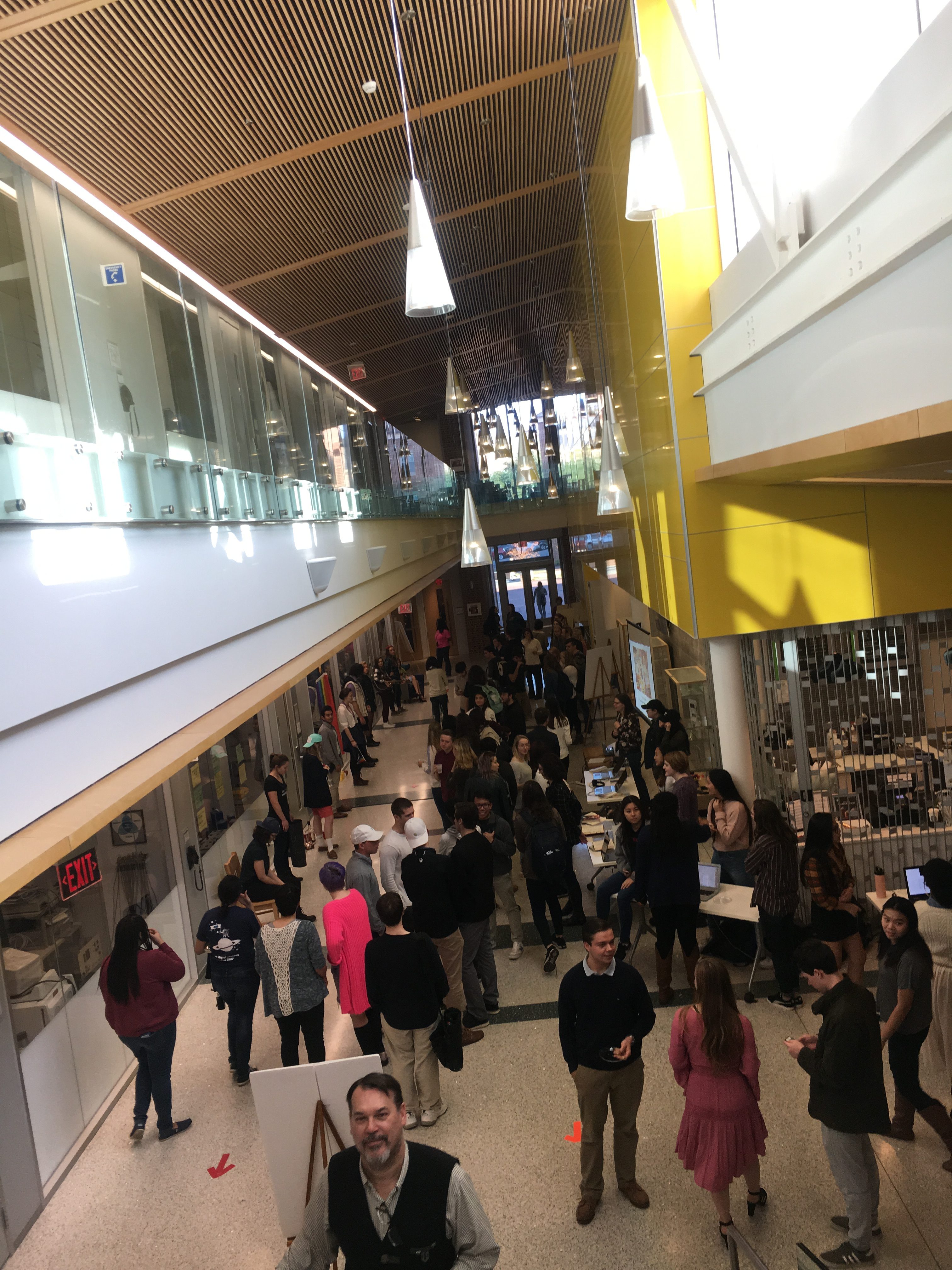
The purpose of COLL 300 is to connect you with people, places, and ideas that take you out of familiar surroundings and deepen the way you see yourself in the world. To introduce you to people and ideas that are outside your sphere of direct experience. To challenge your ways of thinking. To make you a little uncomfortable.
This Fall 2017, two of our Hispanic Studies Courses formed part of the COLL 300 on campus experience theme of In/Exclusion: HISP 330: Poetry Writing Workshop, taught by Professor Silvia Tandeciarz, and HISP 390: Queer Latinidad, taught by Professor Christina Baker.
In both HISP 330 and 390, students took on performative articulations of self-reflection throughout the semester by means of performance and poetry. These acts and refined pieces were showcased in the end-of-semester COLL 300 Academic Festival, held December 1st, from 2:00pm-5:00pm in ISC III.
Students in HISP 330, the Poetry Writing Workshop taught in Spanish, chose to feature their creative work in a “poetry walk.” Designed on large poster boards and curated along brightly light hallways, the poems brought effervescence and freshness to the space of ISC III. The display series of large poster boards, designed by the students, accompanied the installation with translations of their poems, and framed the exhibit with the following mission statement:

Students in HISP 390 performed an living wax museum of stereotypes called, “You Don’t Know My Life,” inspired by the Radical Performance Pedagogy of Guillermo Gómez Peña. The students each enacted a stereotype, performed only at the inducement of the public and at the end of the perofrmance, came together to break down walls of isolation and misunderstood identities. Our docent carried around our collaboratively created Artists’ Statement:

Here is a small gallery of other photos from the event:


Experiences in Granada, Spain
Julie Luecke (French and Francophone Studies, ’20)
 In 2014, I spent three days in Granada, Spain, with a family I had known growing up. I distinctly remember walking around the fountain at los Reyes Católicos, the main square in Granada, with braids in my hair but not a single Spanish word in my mouth. I learned a few simple phrases (like no puedo ver–extremely useful for trying to watch TV with 5 younger children), but I swore I’d come back one day when I could truly appreciate the city by speaking its language (and ordering at Los Italianos, a gelato shop, by myself).
In 2014, I spent three days in Granada, Spain, with a family I had known growing up. I distinctly remember walking around the fountain at los Reyes Católicos, the main square in Granada, with braids in my hair but not a single Spanish word in my mouth. I learned a few simple phrases (like no puedo ver–extremely useful for trying to watch TV with 5 younger children), but I swore I’d come back one day when I could truly appreciate the city by speaking its language (and ordering at Los Italianos, a gelato shop, by myself).
Three years later, I sat at the base of the same fountain at los Reyes Católicos with braids in my hair with my three host sisters, giggling and exclaiming at each other en español.
Through the Charles Center, I had received a grant to do cultural research in Granada, the final Moorish stronghold in the 1400s. In order to communicate with participants in my research though, I had to get a hold on the Spanish language. I had taken French all through high school (and am now a French major), so I was able to take accelerated Spanish classes with absolutely incredible professors: Profesora Carrion in the fall and Profesor Terukina in the spring.
Originally, I only took Spanish classes in order to conduct my research in Spain, but I loved class so much (especially thanks to two of my classmates, Will and Diana, who made having class EVERY MORNING at 9am bearable) that I decided to continue upon my return to the states. In Spanish 207 this fall with Profesora Baker, I remember turning in my first essay in Spanish, thinking, wow, just over a year later, I am capable of producing a coherent, persuasive, work in a language I had promised myself years ago that I would learn. It wasn’t particularly complex, but I was proud of my small feat on the way to fluency.
Unfortunately, I have to take next semester off Spanish classes as I study in Morocco, though I hope to continue its usage, especially in the Northern part of the country. I’ve still never ordered at Los Italianos by myself though, so it looks like I must take a small detour to Spain to visit my host family and their beautiful city again.
Hispanic Studies Students Meet Pulitzer Center Grantee Journalist
–This collaborative article was authored by the Hispanic Studies 208 students in Cate-Arries’ class.
As part of a class unit on investigative journalism, immigration, and refugees in the Spanish-speaking world, students in Professor Cate-Arries Fall 2017 Hispanic Studies 208 course met with the award-winning freelance long-form journalist Malia Politzer during her October campus visit to William and Mary.
Politzer (b. 1983, San José, California; B.A. Hampshire College; M.S. Columbia University) has made a name for herself by reporting on the international refugee crisis, including Europe’s primary migration corridor from North Africa to Spain, and regularly publishing her articles in The Economist, Wall Street Journal Asia, Foreign Policy Magazine and Institute of Current World Affairs Letters. Currently based in Spain where she is pursuing a Ph.D. at the University of Granada, Politzer spent the past two years traveling in Niger, Sicily, Turkey, and Germany for her 2016 Huffington Post Highline piece, “The 21st Century Gold Rush: How the Refugee Crisis is Changing the World Economy,” awarded the “2017 Overseas Press Club Award for Best Digital Reporting on International Affairs”. (http://highline.huffingtonpost.com/articles/en/the-21st-century-gold-rush-refugees/#/niger)
In her lecture, Politzer opened with the statistic that there are 22.5 million refugees worldwide (“the most refugees we’ve had since WWII”), and her ensuing remarks point to her success in putting a human face on this daunting, growing number of refugees. When asked about her most inspiring, memorable encounter with one of these displaced individuals, Politzer immediately responded with the story of a Syrian refugee in Turkey, Muhammed. She “fell in love” with the incredibly intelligent boy who loved learning, teaching himself computer programing at a young age, who now no longer had access to formal schooling.
Recognizing that at times it is difficult to see how her investigative reporting “makes a difference” given the often staggering scale of hardship that her informants endure, Politzer did recall with satisfaction her coverage of the case of Mexican immigrant Oscar Vasquez, a “Dreamer before the Dream Act.” Vasquez came to the U.S. as a child, was one of four undocumented Phoenix high school students whose 2004 underwater robotics team beat out MIT in a national competition, and completed his mechanical engineering degree as a ROTC student at Arizona State University. However, without documentation Vasquez was unable to accept the engineering job offers he received. Married, with a child, he returned to Mexico in an effort to legalize his status in the U.S., but received a 10-year penalty for his undocumented status in the U.S., and was unable to reenter the country. Politzer’s piece about the Vasquez family’s plight attracted the attention of a senator, who took up the case, and sponsored Vasquez on his path to U.S. citizenship (http://www.phoenixnewtimes.com/news/return-to-sender-the-feds-fueled-by-local-anti-immigration-hostility-are-draining-talented-undocumented-youth-into-mexico-6446417). Politzer remarked that often her stories address large issues with abstract resolutions, so this particular outcome was a gratifying moment for her, because of the direct impact that her reporting had on Oscar’s situation.
One of the most compelling facets of Politzer’s coverage of the refugee crisis, and of her and “The 21st c. Gold Rush” photographer Emily Kassie’s efforts to document refugee economies, is their challenge to the conventional narrative about refugees as passive victims and huddled masses, with no agency. Her stories include accounts of refugees’ creative incursions into local economies, sometimes benefiting the quality of life for the larger refugee community. A common thread among these actors on the world stage of the crisis of displaced persons, according to Politzer, is that they are “engaged in making economic decisions about their lives. They aren’t just waiting helplessly to do things, they’re actually actively participating.” On the other hand, Politzer warns, many people have “figured out how to profit from global instability, also known as human suffering,” and as long as this phenomenon continues, it is hard to see an end to the refugee crisis.
This past November 8 – 12, 2017, Professors Carmen Sanchis-Sinisterra and Christina Baker traveled to Santo Domingo to attend the annual conference, Asociación Internacional de Literatura y Cultura Femenina Hispánica.

Professor Sanchis-Sinisterra has attended the conference the previous two years, having even been awarded recognition as a doctoral candidate.This year, Professor Sanchis-Sinisterra presented on Thursday, November 9th, 2017 on the topic of Podemos. Her talk, “A nosotras todavía no nos representan: Feminismos en Podemos” discussed the feminist approach of Podemos, the Spanish political party that was born after Spain’s Occupy movement, called “el 15 M.” Podemos embraces a populist feminism which has is many detractors among feminist theorists.
Professor Baker presented on the morning of Friday, November 10th, 2017. Her talk, “Como la flor: Queer Performances of Memory, Mourning and Selena Quintanilla,” was performative in nature, blending her intellectual interests in the world of performance theory with theoretical concepts. She discussed the living memory of slain singer, Selena Quintanilla by recounting her own trips to Corpus Christi, Texas and acts to remember and revive the singer enacted by queer bodies throughout the Southwest.

Professors Sanchis-Sinisterra and Baker also coincided with W & M alumna, Professor Elena Lahr-Vivaz (’96), who just published a phenomenal contribution to Mexican Studies and Film & Media Studies. Her book, Mexican Melodrama: Film and Nation from the Golden Age to the New Wave, was released at the University of Arizona Press in 2016 and she is working on a follow-up book project that explores Cuban identity. Professor Lahr-Vivaz gave a wonderful talk, “Disappearing Acts: Gender and Gaze in ¿Quién diablos es Juliette?” prompting conversation about Mexico-Cuban cinematic relationships and popular culture.
When Professors Sanchis-Sinisterra and Baker were not attending academic talks, the two explored the beautiful colonial zone of Santo Domingo. Walking through the cobblestone streets and museums, the two thought about the connectedness between colonial cities; one the site of Christopher Columbus’ arrival to the New World; the other, Williamsburg, the heart of colonial United States. The two hope to soon return and incorporate cultural lessons learned about the Dominican Republic, its people, literature, music and culture.

*This trip is part of a collaborative teacher-scholar initiative that combines Prof. Sanchis-Sinisterra and Baker’s intellectual work, courses and student research. It was supported by the generous support of Dean Donahue and the Annual Fund.
By Christina Baker and Carmen Sanchis-Sinisterra
On October 27 and 29, 2017, HISP 390: Queer Latinidad and HISP 324: Mujeres detrás de la cámara joined together in a critical thinking and creative practice initiative. The students from both classes had previously studied the film, Danzón(1991), which is a film that transgresses gender expectations and storyline objectives set forth by Mexico’s Golden Age of Cinema. However, from the perspectives of feminist and queer theories, Prof. Sanchis-Sinisterra and Prof. Baker asked the students to re-imagine the film’s final scene. Mixing things up, students were put into small groups with members from both classes in order to benefit from one another’s expertise. The groups first discussed the scene and shared their knowledge of respective theoretical concepts stemming from the Hispanic Studies courses. The groups were then asked to perform the final scene (approximately 2 minutes in length) using the props provided or any other materials they found useful.
After all groups had finished performing, we had a final task in which they were asked to think about what we had done as a group via this activity. The students responded with thoughtful responses such as break down gender binaries and norms as well as the very important basic steps of thinking critically and performing. Overwhelmingly, the students enjoyed the ability to work together and to share in blending the barriers between critic and creator. This collaborative effort was part of a year-long initiative across theoretical frameworks and classes. From these courses, Prof. Sanchis-Sinisterra and Prof. Baker are taking five students to the Mid-Atlantic Council on Latin American Studies, March 8-10, 2018. These initiatives have also received the generous support of Dean Donahue and the Annual Fund. Below are a few photographs of the event.
This year, we are excited to welcome Dr. Noel Blanco M ourelle to join the Hispanic Studies Program. Dr. Blanco Mourelle is an Assistant Professor, coming to us from Columbia, where he finished his Ph.D. in 2017. We sat down with Dr. Blanco Mourelle to get to know him, his research, and his teaching a little better.
ourelle to join the Hispanic Studies Program. Dr. Blanco Mourelle is an Assistant Professor, coming to us from Columbia, where he finished his Ph.D. in 2017. We sat down with Dr. Blanco Mourelle to get to know him, his research, and his teaching a little better.
How do you feel teaching at William & Mary
I feel it is a great and unique experience. Part of what makes students so great here is that their intellectual abilities are not paired with cynicism about the world. They have a very specific and incredible ability to engage with the class material. It is so refreshing and wonderful to see that they are empathetic and connected.
What are you teaching this year?
I am teaching a medieval studies course, HISP 324, which explores the notion of nations without borders. The course explores Medieval Iberian cultures across geographic territories or religious beliefs. It also adds a linguistic dimension to the notion of nationhood. This all makes students reflect upon the fact that the cultural tapestry of Medieval Iberia is made of people across Christian, Jewish and Muslim practices writing in a variety of languages. This sort of cross-pollination is what makes this specific period so special.
I am also teaching an introduction to literary criticism course, HISP 208. This is a very special class that allows students to progress in their critical thinking skills as well as language domination. They progress from poems to short stories to novels, allowing them to very tangibly measure their development; they see their reading and discussion skills develop into powerful arguments throughout the course of the semester.
In the Spring I will be teaching a COLL 150: Waiting on the End of the World and a Masterpiece seminar on Cervantes. That course will cover, of course, Don Quijote, but it will also include some of Cervantes’ lesser-known works, and I am very excited about it.
If you could teach your “dream course,” what would that look like?
Well, my upcoming COLL 150 course is pretty close to my dream course. This course is looking at the notions of the apocalypse and our human obsession with finitude. I’m designing the course around the idea that one day our species might end and the way that that anxiety plays out in social fears and discourses of perish. More than that, through these fears, there is a contradiction between humans as conceived as the center of our own world and the fact that it very well might not be. I am always interested in issues-driven courses as opposed to specific traditions or styles.
In the future, I would like to cover other issues like the question of conversion through lenses like juridical and anthropological points of view in the Iberian archive. I would also love to teach a future course on the Inquisition.
Do you have any plans for supporting student research?
One of my fields of research and training is the history of the book. The book being tangible and I have already taken students to the archives here in Swem. I like to take them once or twice a semester to go through special collections and start to consider the materiality of the past. But I am very interested in, and hopeful that I can, take them to the National Library and other special collections in this area. I think working with archives offers a complex and nuanced version of the past. I mean, it is great to see the nice and tidy book that comes from Penguin Books USA, but it’s amazing to see the way, for example, Don Quijote was read over the centuries. It is so different to see the notes and the editions change over time.
What is your current research project?
My current project is about learning technologies in between the Iberian Medieval period and Early Modern period. I am dealing with two issues, the first being something I would call a question about political theology. I am considering the struggle to separate the temporal and religious powers in society and how that difference plays out in intellectual and pedagogical culture. The second part of this project considers how specific medieval intellectual techniques are re-purposed in the Early Modern period to achieve the expansion of the empire. This is really about situating the Iberian experience within a Global Context of New Spain, the Counterreformation and other impactful events.
Can you tell us a little about where you come from and how you are adjusting to Williamsburg?
I am used to moving around. I completed my undergraduate degree in Spain, at the Universidad de Santiago de Compostela. There, bachelor degrees are five years, so I did my study abroad during my fourth year. I spent the year in Italy, in a town called, Bologna, and it was an absolutely transformative and mind-blowing experience. Because of that, I always, always, recommend to my students to do a study abroad. When I cam back to my university, I just knew I needed to continue my studies within this setting of intercultural exchanges. So, I completed my Master’s degree in Paris and then decided to do my Ph.D. in the United States. I applied to graduate school without really knowing how it was, since I had never even been to the U.S. before. Actually, my first time was coming as a prospective graduate student! I decided to go to school in New York, at Columbia University. I feel super lucky to be here in Williamsburg. I love it here at William & Mary. Everyone asks if I have had trouble adjusting, but I would not say so. It feels very nice to be here.
Thanks, Dr. Blanco Mourelle. We look forward to seeing you around campus more this Fall!
Prof. Terukina specializes in the transatlantic Hispanic world (Spain & the New World) during the early modern period (16th and 17th centuries). His teaching and research pay due attention to the relations between pre-modern disciplines, political context, and cultural production. He is the author of El imperio de la virtud. Grandeza mexicana (1604) de Bernardo de Balbuena y el discurso criollo novohispano [The Empire of Virtue: Bernardo de Balbuena’s Mexican Grandeur (1604) and Creole Discourse in Colonial Mexico], an interdisciplinary study of one of the most canonical pieces of cultural production in Colonial Mexico that invites us to reassess the role that Balbuena and Grandeza mexicana play in the cultural history of present-day Mexico.
In an interview with the W&M Alumni Magazine, Prof. Terukina explains that he is “impressed with the intellectual curiosity of William & Mary students.” [PDF: WMAM_Fall2017] In his remarks upon receiving this honor at a special ceremony, Prof. Terukina explained that the award belongs to his students, “for unfailingly embarking with me in the scary, unsettling adventure of questioning all we know and how we know it, and hence accepting our historical contingency. I’d like to think that my students find the chance to design themselves anew with even stronger convictions, with deliberate agency, and with a clear understanding of their role as political animals.”
![El imperio de la virtud. Grandeza mexicana (1604) de Bernardo de Balbuena y el discuso criollo novohispano. Woodbridge [UK]: Tamesis Books, 2017. 418pp + illustrations.](http://globalvoices.wm.edu/files/2017/06/9781855663114_1_1-200x300.jpg)
Against the normative proto-Mexican and criollista reading of Grandeza mexicana (1604), El imperio de la virtud positions Bernardo de Balbuena’s work in an Atlantic context and hence interprets it as a political assertion of the natural right of peninsular émigrés to rule New Spain.
The book offers an updated biography of Balbuena that reminds us of his ties to the Iberian Peninsula, and traces the pre-modern rhetorical, scientific, geopolitical, and economic paradigms upon which Grandeza mexicana is designed. Thus, the work analyzes Balbuena’s encomium of Mexico City as a political prise de position in favor of peninsular émigrés like Balbuena himself, who are allegedly endowed with the moral and intellectual virtues needed to direct the spiritual and temporal life of the viceroyalty, and against the morally deficient criollos and the barbaric Indians.
El imperio de la virtud invites us to reassess the role that Balbuena and Grandeza mexicana play in the cultural history of present-day Mexico.

By Prof. Carmen Sanchis-Sinisterra
Many years ago I saw a play that changed my relationship to theater; it was a rupturist staging of La vida es sueño, a 17th-century masterpiece by Pedro Calderón de la Barca. It touched some place very deep in me and, since that day, theater is one of the art forms that I admire the most. Why then—I often wonder—do I fail to include theater in my syllabi? This semester, inspired by my colleague Prof. Christina Baker and with her precious help, I decided to introduce and experiment with embodied pedagogies in the classroom. In our course devoted to literary criticism, HISP 208, students creatively and critically engaged with the famous play by Croatian-Chilean author Sergio Vodanović, El delantal blanco (1956). What follows is the explanation of the project by three of my students in their own words:
“El delantal blanco was a thought-provoking play that we read for my Literary Criticism course in Hispanic Studies,” says freshman Joel Calfee (’20). “The play focused on a woman and her maid spending the day at the beach, and the work explored themes of social class and gender roles. However, what made this play even more interesting was that our class explored it in a deeper fashion by breaking into groups and performing it in front of the camera. We were instructed to act out sections of the play, while having one director film it and add any personal touches that seemed necessary. Once all of the projects were completed, we watched them as a class, and it was very interesting to see everyone interpreting the lines uniquely. This project showed us that written works can be absorbed by students in so many distinct ways.”

The challenge of performing scenes from El delantal blanco led students to constantly revisit the script and explore meanings that otherwise may be lost in a simple, quick reading of the print version. “Although at first I stumbled through the words and awkwardly moved in front of the camera, I gradually became more comfortable,” adds Ashlynn Sommers (’20). “By the end, I realized that through the process of filming I was able to better understand the play and it made me more confident in my Spanish-speaking abilities.”
The performances offered by students were far from a simple, mechanical enactment of Vodanović’s play. Rather, it was a collaborative enterprise that allowed students to creatively craft meaning beyond the literal words of the script. Caroline Nutter (’18) explains this creative process as follows: “We decided to drive to the beach to film our portion (the play is set on a beach), and the other actress and I decided to switch characters halfway through because I fit the role of one character better than she did. It is encountering these artistic problems, and finding creative ways to solve them, that made this project so enjoyable.
Surprisingly, my students forget to mention the performance of a scene of El delantal blanco that Professor Baker and I did for them in front of the class—i.e., live! We certainly have not; practicing our lines, trying out costumes, and choosing props transformed that particular class into a special event in which, via embodied practices that led from page to stage to screen, students accessed and generated layers of meaning that would otherwise be elusive or lost in a print text.

Allison Corbett (’09) is a Spanish interpreter and oral historian based in New York City. She has worked in Mount Sinai St. Luke’s and Mount Sinai West as a staff interpreter, and is currently working on The Language of Justice/El lenguaje de la justicia, a multimedia oral history project documenting the stories of language workers and organizers around the US who facilitate multilingual movement-building for social change. You can read more about the project here.
During her time at W&M, Allison wrote an honors thesis under Prof. Arries on “Un modelo de resistencia, un estado neoliberal: Teacher and Student Responses to the Death of Carlos Fuentealba.” She also received the Howard M. Fraser Award in 2009 for the graduating HISP major who has made significant achievements in the area of research and service related to the field of Hispanic Studies.

The RiverRun International Film Festival is one of the premier film festivals in the southeastern US. Celebrated in Winston-Salem, NC, this year (March 30-April 9 2017) the organizers invited Prof. Ann Marie Stock to present a special program entitled “Cuba on Screen: Perspectives through Retrospectives.” The program included a selection of short films such as Conexión (2016), Kid Chocolate (1987), Presidio Modelo (2008), and Soy cubana (2016), but also feature-length Cuban classics like Soy Cuba (Mikhail Kalatozov, 1964), Vampires in Havana (Juan Padrón, 1985), Memories of Underdevelopment (Tomas Gutiérrez Alea,1968), and Lucía (Humberto Solas, 1968), and Santa y Andrés (Carlos Lechuga, 2016).
When asked to comment on the selection, Prof. Stock shared: “Memories of Underdevelopment (1968) and Lucía (1968) are two classics of Cuban cinema. Many people in the first world learned about Cuban cinema thanks to these two jewels. Both directors—Tomas Gutiérrez Alea and Humberto Solas—joined in the search for a cinematic language appropriate for the new Cuban revolutionary context. And with their respective films, they succeeded in relating stories that were essentially Cuban. These works still resonate in Cuba today. Many young filmmakers continue to be inspired by these films.”
You can read the full press release from Cuban Art News of The Farber Foundation here.
After a few years of varied, enriching, and meaningful experiences–domestically and abroad–, some of our recent HISP graduates have decided to pursue further studies in their aims of becoming stronger civic-minded individuals, activists for education, critical thinkers who question social asymmetries, and forgers of global relations.
During her time at W&M, Maisoon Fillo (Hispanic Studies & Psychology ’15) studied abroad with our Human Rights program in La Plata, Argentina, and participated as an undergraduate TA in our HISP language classes. As she prepares to attend Tulane University and work toward an MA in Latin American Studies, she describes her experience since graduating as follows:

“Soon after graduating from William and Mary, I spent the summer in Vermont perfecting my Spanish at Middlebury Language Schools. This program not only provided an environment of total language immersion, but exposed the linguistic depth of the Spanish language. Shortly following Middlebury, I spent a semester abroad teaching English in Lima, Peru. This position gave me first-hand insight into educational issues in Latin America, from resource and quality shortcomings, to school systems’ relationships with students and the significance of student’s social background. I was able to work through some of these critical issues following my time abroad as an intern in the Inter-American Dialogue’s Education Program. This branch of IAD aims to improve skill development by forging educational change across Latin America.
“Starting this fall I will begin my MA program in Latin American Studies at Tulane University. I expect to further develop skills that I can use in work that contributes to reforms that acknowledge past injustices and promote governments’ sincere regard for human rights. I believe that Tulane’s program will position me to not only advance skillfully as a student, researcher, and activist, but will guide me as a professional in contributing to social transformation projects in pursuit of human dignity and social justice.
Like in Maisoon’s case, intercultural understanding and global citizenship motivated Sam Boone (Hispanic Studies and International Relations ’15) to seek rich experiences abroad. Before becoming an undergraduate TA for the Hispanic Studies program, Sam spent a summer in Cádiz and a semester in La Plata. While at W&M, Sam enjoyed successful spells as Resident Advisor at the Russian House and the Hispanic House. His commitment to building global bridges has shaped his steps after graduation, as he published an article on the role of the US in the tense Taiwan-China relations, and is about to complete his second year teaching English in China. Sam will head to Johns Hopkins’ School of Advanced International Studies in the fall.

“In many ways I have had an interesting career trajectory. At William & Mary, I double majored in Hispanic Relations and International Relations with the idea that I could get involved with policy decisions in Latin America. My experience with the La Plata program in Argentina had a profound impact of my worldview, as I found that living in a foreign country and stepping outside my comfort zone enabled me to grow personally and academically. My time in Argentina made realize that I wanted to step even further and learn a new language. After my graduation I moved the China, and quickly started studying Chinese and fanatically researching the history and culture of my new home.
“I am surprised and happy to say I will continue my education next year at Johns Hopkins SAIS program with a fellowship for Chinese studies. It almost seems unbelievable since two years ago I didn’t even know how to say 你好 (hello) in Chinese and now I will be doing graduate level courses. It truly demonstrates the unpredictability in life, and how passions can evolve and transform. This opportunity would have been impossible without the skills and knowledge I gained from Hispanic Studies at William & Mary. My classes in the Hispanic Studies department gave me the tools I needed to adapt and analyze Chinese culture. I hope that I can combine my two foreign language studies in graduate school and further investigate China’s growing role in Latin America.
While Maisoon headed to Perú and Sam to China, a semester in Chile was in the horizon for Kristin Giordano (Hispanic Studies & Linguistics ’14) soon after graduating in 2014. Having been an undergraduate TA for the Hispanic Studies program, and after spells in La Plata, Argentina, and in Nicaragua with MANOS, Kristin’s semester teaching English in Chile proved to be a great experience. Upon returning to the US, and being the civic-minded, community-engaged young adult that she is, Kristin carved a path for herself in public health, and even co-authored an article on EMS responses to behavioral health crises. As she prepares to start a Masters in Public Health at Drexel University (Philadelphia, PA) under a fellowship, Kristin describes her trajectory as follows:

“Before I graduated in May 2014, I had vague thoughts of traveling the world, or at least having some (any) plans to explain when people inevitably asked what was next for me. When Prof. Terukina mentioned the English Opens Doors Program in Chile to me, I jumped on the opportunity. I loved the six months teaching English in Chile and the family I lived with, yet, when the semester ended, I knew that I wasn’t ready for a full-time job in education. Again directionless (and with loans to start paying off), I moved home.
“I found a job in respite care and then a seasonal job at a summer camp (that I loved). Through a friend, I started volunteering with the Fire Department’s emerging Community & Public Health Division in Colorado Springs, which became a full-time job. Now, I’ve spent two years there, working in a program that connects people who frequently call 9-1-1 with medical, social, and mental health services. Though my volunteer position started as data entry, I ended up writing and winning grants, analyzing program data and designing reports, and even helping to implement a new software program.
“My job’s flexibility meant that I got to do a little bit of a lot of things, but the organization’s focus on partnerships with other agencies meant that I met people across the health sector. Through conversations, conferences and my daily job responsibilities, I learned that I really enjoyed work with upstream health interventions and research-based interventions. I wanted to develop the evaluation skills and knowledge base necessary to help similar programs. After two and a half years of discovering the joys and the frustrations of the working world, I wanted to go back to school.
“My friends, classmates and professors from William & Mary were fundamental parts of my frantic attempts to figure out where I was headed. Between Skype calls with classmates who were in programs I was interested in, and advice and recommendation letters from professors, I crammed my GRE, school research and application submission in to a two month period.
“In September, I’m off to Drexel University in Philadelphia to get my Masters of Public Health, with a concentration in Community Health and Prevention. I was offered a fellowship with their Urban Health Collaborative, which works to synthesize community data and make it available to organizations and individuals who live there, so that they can improve their health and well-being. Where I go from there, I have no idea – so don’t ask – but I’m excited!
The Hispanic Studies program wishes the very best to Maisoon, Sam, and Kristin as they embark in this new chapter in their lives! We are always eager to hear your latest news! You can send us your news and updates here, or just email your former professors!

Three Hispanic Studies majors teamed up to translate an essay by Cuban filmmaker Carlos Rodríguez. Nathaniel Clemens (’17), Kyle McQuillan (’17) and Morgan Sehdev (’17) will have their work published in the forthcoming book, The Cinema of Cuba: Contemporary Film and the Legacy of Revolution, co-edited by Professor Ann Marie Stock. This faculty-research project was an outgrowth of the Cuba-Culture-Curate course co-taught by Stock with Troy Davis and Jennie Davy of W&M Libraries.
These three seniors were among the 16 students who traveled to eastern Cuba during spring break 2016. Their mission was to enhance their study of Cuban culture and cinema. They went “on location” in the Sierra Maestra mountains and elsewhere in rural Cuba. They traveled up winding narrow roads, high into the mountains, where they encountered their destination: the community media organization, Televisión Serrana. “We, as a class, were asked to conjure up the images that come to mind when we think of Cuba – old cars, cigars, rum, art, the Cuban flag, santería… (to name a few). But we also listed the mountains, the Sierra Maestras, once home to the Revolution, and now home to this revolutionary project of TVS,” commented Sehdev. “I felt that I was in Cuba the moment I stepped off the plane, but I felt that I was in the real Cuba, the heart of Cuba, when I laid eyes on the breathtaking and pristine Sierra Maestras. The mountains of el Oriente were filled with beautiful places, beautiful people, and beautiful projects, thanks to TVS.”
The students connected with members of the local community as well as with film students, regional leaders, and filmmakers. “Getting the opportunity to learn from people like Jorge Luis Barber, Carlos Rodriguez, and the filmmakers at TVS was one of the most impactful parts of the trip. It is so special and unique to get see the country and culture through the eyes of people that make a living documenting it. We not only made connections in Cuba, we made real friends that allowed us to truly connect with the island,” said McQuillan. “Leaving Cuba at the end of the trip was really difficult for all of us, primarily because it meant leaving Jorge Luis and Carlos, but we have all been able to keep in touch and maintain the connections we made.” Carlos Rodríguez, a longtime collaborator with Stock and W&M Libraries, was pleased to be invited to contribute an essay to the volume, and even more enthusiastic to have his work translated into English by these three students. “Thanks to Morgan, Kyle and Nattie, and the ongoing efforts of Ana María, our work at TVS is gaining greater visibility,” noted Rodríguez. “This really matters to us!”
Following this Study Away experience, made possible by generous support from the Philpott-Perez Endowment, Reilly Funds, Charles Center, and Reves Center, Workshop participants shared their discoveries. They curated an exhibit of film posters in Swem Library’s Botetourt Gallery, they created two videos capturing highlights of the experience, and they carried out an art project with local elementary students. “Sharing our research and experience back on William & Mary’s campus was one of the most meaningful parts of the study,” noted Clemens. “To learn about Cuba through film, through the lens of Cubans themselves, offers an important contribution to the conversation about the island. By bringing these artists and their work to our campus, we hope to help amplify these voices and share their authentic stories.”
The book is due out from I.B.Taurus (U.K.) in summer 2017.
A warm April afternoon and an inviting room at the Cohen Career Center ornamented by faculty and students were the perfect scenario for an eagerly anticipated celebration of the community forged by Hispanic Studies students, faculty, alums, and enthusiasts. The intellectual and affective community that the Hispanic Studies program at large nurtures every day was able to share some time, food, good conversation, and laughs as students talked about their experiences in our program, met other students, and even mapped future trajectories! Faculty were able to reconnect with former students, and meet future students; W&M alums such as Allison Corbett (’09), currently working on an oral history project called The Language of Justice/El lenguaje de la justicia, were able to share their thoughts and their excitement about HISP; and Sean Schofield, Assistant Director at the Cohen Career Center, joined us to share his insights and to remind everyone that the kind of intercultural communication and competency in which HISP students are trained are key skills for every global citizen in today’s world.
Thanks to the effort of Profs. John Riofrio, Paulina Carrión, Christina Baker, Mariana Melo-Vega, and Carmen Sanchis-Sinisterra, over sixty people had the opportunity to celebrate being part of our Hispanic Studies community, and to take turns trying to hit a most elusive piñata!
As part of the Bellini Colloquium series for spring 2017, Prof. Christina Baker shared her research with colleagues and students. On April 20, Prof. Baker presented a talk entitled “(Re)EnActments of Belonging: Performances of Mexicanidad in Cabaret and Film.”

Prof. Baker’s presentation focused on how the Mexican contemporary cabaret group, Las Reinas Chulas, uses performative means to critique definitions of mexicanidad (or, Mexicanness) proliferated by Mexico’s Golden Age Cinema (1930-1960) and its on-screen idols. Prof. Baker explored how a particular piece re-enacts one of Mexico’s most successful films of all time, Nosotros los pobres (1948), and its lead actor, Pedro Infante (Think Clark Gable and Gone With the Wind). The piece she analyzed was Nosotras las proles, which she saw performed live in 2013 by the cabaret group. The piece, as indicative by the title, is a play on words, but also a critique of articulations of Mexicanness, belonging and state policies. In the piece, by absenting Pedro Infante from his quintessential role, coupled with his melodramatic confession of homosexuality, Prof. Baker engaged with queer studies to propose this piece drags and reorients masculinity, heterosexuality, and the family unit. Prof. Baker’s engaging talk generated a lively discussion.

The Bellini Colloquium is a lecture series sponsored by the Department of Modern Languages and Literatures. It is named after the first Professor of Modern Languages at the College, Carlo Bellini, a native of Florence, Italy and close friend of Thomas Jefferson. Bellini taught French and Italian from 1779 until 1803, and holds the distinction of being the only Professor to stay in residence at the College when classes were suspended for two years during the Revolutionary War.
***

Katie Freund, a HISP and Econ double major, has recently been awarded a prestigious Fulbright English Teaching Assistantship to teach in Mexico next year. After a successful semester abroad in Chile, and hoping to foster intercultural understanding and communication, Katie decided to apply for a Fulbright scholarship that would give her the opportunity to live and teach in Mexico. You can read an extensive interview on her thoughts about the application process and her advice to future applicants at the website of the Charles Center’s Peer Scholarship Advisors. Katie is one of the twelve W&M students to have been awarded a much coveted Fulbright Scholarship this year.
This year, Katie has been working on her Honors Thesis under the mentorship of Prof. Cate-Arries. She presented parts of her project as “Creative Interventions in Latin America: Economic and Social Projects that Work” at the Charles Center’s Eighteenth Annual Honors Colloquium, last February. More recently, she presented a paper at a professional conference, sharing a panel with Prof. Baker and Rachel Merriman-Goldring (’17) at the conference of the Mid-Atlantic Council for Latin American Studies (MACLAS).
On April 12, Executive Director of Freedom University, Laura Emiko Soltis, and three undocumented student leaders, shared with a packed Commonwealth Auditorium the experiences and insights from their bold experiment: to empower undocumented youth and fulfill their human right to education. Inspired by the legacy of the Southern Freedom School tradition, Freedom University provides tuition-free classes, college application and scholarship assistance, and social movement leadership training for undocumented students banned from public higher education in Georgia.
The full presentation is available on video.
COLL 300 campus visitors bring the world to W&M. They aspire to stimulate a fruitful experience of disorientation that allows students to see their own lives in broader perspective.
Spring 2017 Campus COLL300 Theme “Unrest:” At an institution dedicated to inquiry and examination, the intellectual waters are always in a state of unrest. Unrest, in a scientific sense, can imply loss of equilibrium. Unrest can be one feature of a psychological state leading to questioning or creativity; of a social state leading to criticism or conflict. Unrest can be a stimulus or a crisis, a challenge or a moment.
The Event was sponsored by the Center for the Liberal Arts, Dean’s Office, Arts & Sciences, American Studies Program, Hispanic Studies Program, Latin American Studies Program, Department of Sociology, Latin American Student Union.
During 2016-17, the Department of Modern Languages & Literatures, and the W&M community at large, enjoyed an informal and lively film series on the representation of women in film. The film series, aptly titled Mad-Made Women, was a unique opportunity to engage in discussions of gender, psychoanalysis, sci-fi, etc., and watch a variety of movies. During Fall 2016, the series included movies such as Ernst Lubitsch’s Die Puppe [The Doll] (1919), Hitchcock’s Vertigo (1958), Bryan Forbes’ The Stepford Wives (1975), and Blade Runner (1982). This Spring 2017, discussion followed the viewing of films that included George Cuckor’s My Fair Lady (1964), Hirokazu Koreeda’s Air Doll (2009), Almodóvar’s La piel que habito [The Skin I Live In] (2011), Alex Garland’s Ex Machina (2015), among others.
The film series was co-organized by Prof. Julie Hugonny (French & Francophone Studies) & Prof. Carmen Sanchis-Sinisterra (Hispanic Studies).

By Prof. Christina Baker.
Seniors, Katie Freund and Rachel Merriman-Goldring, presented at the Middle Atlantic Council of Latin American Studies (MACLAS), held at the University of Virginia, March 24-5. The senior Monroe Scholars attended panels on the topic of articulating Latin/o American identities in the United States on Friday, March 24th, engaging with presenters during Q & A sessions and beyond, during the reception and dinner portion. The two also presented during the 8:00 am session on Saturday, March 25th, accompanied by Visiting Assistant Professor of Hispanic Studies, Christina Baker. Their panel, At the Intersections of Artistic Engagement: Creative Initiatives, Embodied Acts and Social Justice, garnered the attention of several scholars and community members from Virginia, Pennsylvania and Mexico.

Rachel Merriman-Goldring, a senior majoring in Environmental Science and Policy, with interdisciplinary interests, presented on the topic of materiality and art. Her talk, “Matter in Art: Vital Materiality in Vik Muniz,” applied theories of materiality by Jane Bennett to the work of Brazilian visual artist, Vik Muniz. Merriman-Goldring explored questions of ethics, art and affective qualities in Muniz’s work, which uses re-animates items from the trash dump, Jardim Gramacho, on the outskirts of Rio de Janeiro.
Katie Freund, a senior majoring in Hispanic Studies and Economics, presented on notions of creative industries, performance art and poetry with a focus on Colombia. Her talk, “Creative Interventions in Latin America: Economic and Social Projects that Work,” explored part of her senior thesis process. Blending theories from various disciplines, Freund highlighted the importance of artistic endeavors, and specifically, the Medellín International Poetry Festival amidst environments of violence and social upheaval.
Christina Baker, Visiting faculty in Hispanic Studies, presented, “Sounds of a Modern Nation: Mexico’s Landscape of Terror and Soundscapes of Fear,” rounding out the hemispheric and inter-arts conversation. Her presentation explored a particular theatre piece through theories of embodiment, musicology and post-traumatic stress. Part of a broader consideration of sound praxis and social trauma, this talk considered Mexico’s border region, drug violence and bullets as fertile ground for sound creation.
To hear the first minutes of Katie Freund and Rachel Merriman-Goldring’s presentations, please see the video here. They will soon be defending their excellent senior theses projects.
Participation in MACLAS was made possible by the generous support of Dean Homza, Latin American Studies, The Charles Center, The Parents Fund and Hispanic Studies.


Cuban filmmaker Aram Vidal was invited to W&M to participate as a special guest at the W&M Global Film Festival this spring. On February 24, Aram screened a director’s cut of his debut feature film El pez azul [The Blue Fish] and discussed his filmmaking process. El pez azul follows Ernesto after he leaves Cuba, abandoning the love of his life, and continues to exist in two stages: his new life in Mexico and his past in Cuba with Clara. While in Williamsburg, W&M Libraries also hosted a “meet and greet” with Aram on February 23, where he shared his work as a filmmaker and showed a few clips from the film.

Aram began his career as a writer. He won the El Caballo de Coral, Premio Nacional FEU prize and the Pinos Nuevos award which led him to publish his book La gente sí se da cuenta (2007). In 2005 he graduated from the University of Havana with a degree in Communication and started to work as a screenwriter and director at the Cuban Institute of Cinematographic Art and Industry (ICAIC). He has participated in artist residencies in Cuba, Mexico and the United States. His fiction productions include Recursion (2012), Relief (2013), and Cat (2016), which have garnered numerous awards. You can watch clips from his films here.
This was not Aram’s first time at W&M. During the summer of 2010, Aram became the inaugural Swem Media Artist in Residence. During that summer, Aram shared his documentary “Ex-Generación”, a film about Cubans who have migrated to Mexico City, and which was subtitled by W&M students in Prof. Stock’s New Media Workshop.
By Prof. John Riofrio.
On December 8, 2016, William and Mary held it’s first-ever Latinx Alumni Reunion in the William and Mary Washington, D.C. Office. Entitled, Encuentro Latino, this exciting first-time event was conceptualized as an opportunity para encontrarse y encontrarnos – to encounter and reconnect with one another. Associate Professor of Hispanic and Latinx Studies John Riofrio, “Rio”, was thrilled at the invitation to offer the evening’s keynote address.

Jessica F. Chilin-Hernández (class of 2012, French and Francophone Studies), who co-organized the event with the Assistant Director of Regional Alumni Engagement Jack Edgar (class of 2015), beautifully articulated the importance of the event for her. “When I first arrived at William and Mary, I felt as if I was the first of my kind: Salvadoran, immigrant, native-Spanish speaker. The founding, however, of the Latin American Student Union in 2009 revealed the presence of Latinxs on campus in ways that I had simply not imagined. The formation of LASU created a space for Latinxs to come together and explore who we were both as individuals and as a community.” WM’s first Encuentro Latino is the first step (of many!) whose sole purpose is to highlight the long-standing presence and contribution of Latinxs on William and Mary’s campus while enabling the possibility for remaining a tightly-connected community well beyond the years spent at William and Mary.
Eager to move beyond simply networking professionally, Encuentro was conceptualized as an opportunity to form new friendships and to renew a bond in the Tribe spirit that defines William and Mary. It was also, importantly, a space to speak Spanish, Spanglish and English, too, because Latina/LatinX/Latino identities cannot, and should not, be confined to one language, one experience, one narrative, one set of words to tell its stories.
The event dovetailed beautifully with William and Mary’s ongoing For the Bold campaign in that one of the primary goals of the campaign is to strengthen alumni engagement with William and Mary. The Encuentro Latino was an effort to connect to an alumni population that had yet to be addressed in a way resonant with their academic interests, passions and particular cultural distinctions. Professor Rio’s talk on the virtues of civil engagement and the need for joy within struggle led to a fantastic group discussion that lasted well beyond the event’s stated end time.
Over the next year, Jess Chilin and Jack are planning more events that will recruit more alumni volunteers to the cause, connecting alumni with professors and academic programs at the College, and giving LatinX alumni the chance to engage and support students of color at William & Mary. The success story of LASU and the first Encuentro Latino represents all that can be accomplished when individual alumni passions, demand, and staff support intersect in meaningful ways.
During the summer of 2016, Prof. John ‘Rio’ Riofrio embarked in the adventure of co-leading our W&M-sponsored program in Santiago de Compostela (Spain); an interdisciplinary, international, and transformative experience.
 Like people since the Middle Ages, Prof. Riofrio, Prof. Allar (Theater, Speech & Dance), and 9 valiant W&M students joined pilgrims from all over the world and covered 197 miles (311 kms) over 13 days, going from León and ending in Santiago de Compostela. While medieval pilgrims were motivated by the tradition that the remains of Saint James the Apostle were in Compostela, our W&M group set out in a challenging interdisciplinary pedagogical experience that included analyzing architectural examples, as well as art and graffiti found along The Way, and classes led by Profs. Riofrio and Allar before and after the actual physical transit along the Camino. Students were also able to reflect on their experience by mapping their trajectory; you can read the thoughts shared by Brooks Henne, Martha Rose Oordt, Quinn Reiley, and Alex Wingate.
Like people since the Middle Ages, Prof. Riofrio, Prof. Allar (Theater, Speech & Dance), and 9 valiant W&M students joined pilgrims from all over the world and covered 197 miles (311 kms) over 13 days, going from León and ending in Santiago de Compostela. While medieval pilgrims were motivated by the tradition that the remains of Saint James the Apostle were in Compostela, our W&M group set out in a challenging interdisciplinary pedagogical experience that included analyzing architectural examples, as well as art and graffiti found along The Way, and classes led by Profs. Riofrio and Allar before and after the actual physical transit along the Camino. Students were also able to reflect on their experience by mapping their trajectory; you can read the thoughts shared by Brooks Henne, Martha Rose Oordt, Quinn Reiley, and Alex Wingate.
For more details on this experience, please check the article by Kate Hoving, A New Curriculum Transforms a Familiar Path, published in the latest issue of the journal of the Reves Center World Minded, 9.1 (Fall 2016): 11-14.
***
For more information on our W&M-sponsored summer program in Santiago de Compostela, please visit the website of the Reves Center. For summer 2017, the application deadline is February 6, 2017.
[Full story by Jim Ducibella here]
“At the end of her most recent trip to [Spain], [Prof. Cate-Arries] asked a local historian and screenwriter, Santiago Moreno, for a copy of a then-unreleased documentary, Three Days in July. The documentary includes interviews with people who experienced the upheaval first-hand or whose loved ones did. If he would send it, she vowed, “My students will do something with it,” meaning a translation into English subtitles.

They’ve kept their promise, finishing a fall 2016 project that maintains an important aspect of William & Mary’s study abroad program at the University of Cádiz. Since the program was established, W&M students have enjoyed a productive collaboration with institutional partners in Cádiz, as well as in Sevilla [Univ. Pablo de Olavide]. W&M students have subtitled three documentaries, and almost half of the student translators have previously studied in Cádiz or Sevilla.
On Nov. 7, in conjunction with the 80th anniversary of the insurgency, Cate-Arries will hand-deliver Three Days in July, to the provincial government of Cádiz, which funded this project and several other initiatives aimed at recovering what she called “lost history.”
“It’s a lovely moment for me as a professor of William & Mary students to take this documentary to the local government that made the film possible, as well as to university affiliates who also worked with William & Mary summer school students over there,” she said. “I’m extremely proud – and grateful – of the work they’ve put in.”
[…]
Translating and creating subtitles for Three Days in July was far from easy. From the outset, Cate-Arries’ translation class of 15 students has worked in teams of two. They each estimated they averaged about 40 hours outside of the classroom painstakingly preparing the film in just 30 days.
“Going into it I didn’t necessarily think it was going to be easier than it was, but I don’t think I was ready for the start … stop … start … stop … start … stop,” said Kyle McQuillan ’17. “It was a very tedious process, especially the original transcription, where you have to listen to the same sentence over and over, and transcribing two minutes can take three hours because you’re trying to separate what sounds like one word but is actually four because they dropped every consonant.”
Subtitling the film in English, Cate-Arries said, will give it world-wide exposure it wouldn’t otherwise receive.
“Spanish limits the audience,” she explained. “Two research assistants here at William & Mary — Robert Bohnke ’17 and Michael Le ’15 — did subtitles on a [previous] documentary, and, subsequently, filmmaker Juan León Moriche was able to enter it in a New York human rights film festival. It didn’t win, but organizers liked it enough to include it in a Civil War film festival this fall. That meant the world to the director because he never could have shown his film in the United States.”
***
During her visit in Spain, Prof. Cate-Arries was interviewed by the local newspaper Diario de Cádiz, and she commented on the experience of working with her undergraduate student in the process of subtitling the film. Especially those who spent a summer in Cádiz with our W&M-sponsored program, it was an extremely valuable and enriching experience: “Estaban muy emocionados y creo que su trabajo va a ser muy valioso para la difusión del documental y de la historia,” she added, proud of her students’ dedication.
These remarks were offered during the public launching event of a new book series of the Universidad de Cádiz, Faro de la memoria. Under the intellectual leadership of Prof. Cate-Arries as General Editor, this new series seeks to offer interdisciplinary and transnational studies of the varied theories and practices of social memory in times of crisis.
***
N.B. Prof. Cate-Arries is the author of Culturas del exilio español entre las alambradas. Literatura y memoria de los campos de concentración de Francia, 1939-1945 (Barcelona: Anthropos, 2012), a much updated and expanded version of her Spanish Culture Behind Barbed-Wire: Memory and Representation of the French Concentration Camps, 1939-1945 (Lewisburg: Bucknell UP, 2004). The latter was awarded an Honorable Mention for the Katherine Singer Kovacs Prize by the Modern Language Association. She has received, among other honors, the Order of the Discoverers from Sigma Delta Pi, the Spanish National Honor Society (2013), and the Outstanding Faculty Award from the State Council of Higher Education of Virginia (2007).
By Prof. Christina Baker.

Adam Taub is not only a documentary filmmaker with many awards and credits to his name, but is also a highly regarded practitioner in the world of Latin/o dance. He joined William & Mary on November 1st, 2016 to give one of his innovative multimedia presentations and Dominican bachata dance workshops. Combining multimedia clips with embodied knowledge, Adam’s work came alive and was greatly enjoyed by his audience members.
With over 70 people in attendance, this unique opportunity brought together faculty, students and community members. From the community, dancers traveled from Norfolk to learn from Adam’s embodied pedagogy while local Dominicans came to reminisce about home. Faculty and staff from Theatre, Speech and Dance, Hispanic Studies, Latin American Studies and the School of Education sat amongst students from Hispanic Studies, Latin American Studies, Film & Media Studies and organizations like the Monroe Scholars, Latin American Student Union and William & Mary Salsa Club. On the dance floor, students, faculty and community members got to know one another as they rotated around the room practicing their new dance moves. Bridging disciplines and conversations, Adam’s talk and workshop created a rich interaction for all.

Beyond his talk and dance workshop Adam’s presence was felt on campus throughout the week as he made appearances and offered guest lectures in courses such as Hispanic Studies 207: Cross-Cultural Perspectives, American Studies 470: Blatinx: Black Identities in Latin America and Latin American Studies 350: Latin American Cultures, Society and Politics. His film, Duke of Bachata (2009) was also screened on Thursday, November 3rd, in Botetourt Theatre.
This event was made possible by the support of the Reves Center for International Studies, the Roy R Charles Center for Academic Excellence, Dean Homza, Hispanic Studies, Latin American Studies, Film & Media Studies, Africana Studies, and Anthropology.


After participating in the W&M Summer program in Santiago de Compostela and the Camino de Santiago, Alex Wingate (’18), a Hispanic Studies and Linguistics double major, enjoyed the truly unique and amazing opportunity of attending the London Rare Books School, at the University of London. During the two-week experience, Alex attended two classes: “Introduction to Bibliography,” and “Provenance in Books.” For one of her assignments, Alex worked on a bibliographical description of a copy of the second part of the Comentarios reales by Inca Garcilaso de la Vega.
To read the full description of Alex’s experience with the LRBS, click here.
In November 2015, Alex and James Sylvester (HISP ’17) did archival research under the guidance of Prof. George Greenia at the Hill Museum & Manuscript Library at St. John’s University in Collegeville, Minnesota. Under the mentorship of Prof. Lu Ann Homza, and as part of her class on Early Modern Spain, Alex did archival work in Pamplona during the Spring of 2016. An aspiring rare book librarian, Alex is currently an undergraduate Teaching Assistant with the Hispanic Studies program, and works at Special Collections, Swem Library.

By Prof. Christina Baker.
The evening of September 26th, 2014, 43 students of Ayotzinapa, in the state of Guerrero, Mexico disappeared. These “normalista” students were studying to become teachers in Mexico and were not only being trained in pedagogy but also leftist political ideals. The night of September 26th, this group of 43, along with many others, embarked on a journey to Mexico City to protest education reforms as well as participate in commemorating the students massacred in Mexico’s Plaza de Tres Culturas on October 2, 1968.

The search for these missing 43 students has unearthed numerous unmarked mass graves in Mexico and many remains of other missing and disappeared citizens. However, the search has yet to produce any evidence of these students. There have been numerous investigations, findings and reports, though no concrete answer exists. The state blames the students and cartels. The families blame the state. The students remain missing and no one has admitted guilt.

In honor of these missing 43 students, William & Mary students from Prof. Christina Baker’s HISP 207: Cross-Cultural Perspectives, in collaboration with Pablo Moral of the Casa Hispánica observed the loss. The students discussed news articles, posed questions and thought critically about how such tragedy could happen. The students, lastly, engaged in an act of mourning and remembrance. The students wrote letters to the missing 43 in solidarity with them and wishing them a safe return. They also participated in an act all too familiar on the streets of Mexico: Counting in unison to 43 and chanting the refrain “Vivos se los llevaron, vivos los queremos” (‘Alive they were taken, Alive we want them’).
[Full article by Tami C. Back here]
Ann Marie Stock, professor of Hispanic studies and film and media studies, has been named the inaugural William & Mary Libraries Faculty Scholar.

In this new position, Stock will partner with library colleagues on several initiatives. Principal among them is the creation of a digital archive to inventory and make accessible the Cuban film materials she has been compiling and creating for some 30 years. The first component of this digital humanities project, an online exhibit of Cuban film posters, is underway. The physical exhibit, “UnMade in Cuba: Carteles de Cine,” is on display in the Botetourt Gallery in Swem through the fall semester.
Stock confesses to being “thrilled” with this new opportunity. She has served in a variety of capacities during her 23 years at W&M — as director of both Hispanic studies and film and media studies, associate dean and acting dean of international affairs, director of the Reves Center for International Studies and a leader in developing undergraduate research opportunities in the humanities.
As part of the Bellini Colloquium series for fall 2016, Prof. Silvia Tandeciarz shared her research with colleagues and students. On September 15, Prof. Tandeciarz presented a talk entitled “Citizens of Memory: Recollection and Human Rights in Post-Dictatorship Argentina,” based on her latest project.
“40 years after the military coup that ushered in the most brutal dictatorship of Argentina’s modern history, human rights activists, cultural practitioners and ordinary citizens continue to struggle to define its meaning. The tolls of this period are well known: thirty thousand disappeared; many more exiled and/or subjected to torture in clandestine detention centers; roughly five-hundred children born in captivity, taken from their biological parents and appropriated by Junta sympathizers to be raised according to its “Western and Christian” ideological principles; and a nation disciplined by the “Process of National Reorganization” whose regime of terror marked its transition from State to market.

“While this story of State terrorism is not unique to Argentina, or to Latin America, the advances in human rights prosecutions of the last decade have turned the nation into a model of transitional justice. This lecture focuses on practices of recollection helped to shape the contemporary landscape. The analysis seeks to illuminate the productive confluence of aesthetic considerations and human rights practices, as well as the sometimes more fraught uses of memory, that this case study makes evident. The central proposition is that the creative labor informed by recall in contemporary Argentina is key not only to the nation’s ongoing project of democratization, but to the formation of citizens dedicated to the collective expansion of present and future spaces of hope.
The Bellini Colloquium is a lecture series sponsored by the Department of Modern Languages and Literatures. It is named after the first Professor of Modern Languages at the College, Carlo Bellini, a native of Florence, Italy and close friend of Thomas Jefferson. Bellini taught French and Italian from 1779 until 1803, and holds the distinction of being the only Professor to stay in residence at the College when classes were suspended for two years during the Revolutionary War.

Professor Teresa Longo is a faculty member in Hispanic Studies in the Department of Modern Languages and Literatures who brings immense experience and a great passion to her groundbreaking scholarship, interdisciplinary teaching and devoted service. As the dean for educational policy and dean for curriculum review, she worked on the design of William & Mary’s new College Curriculum, which emphasizes an integrated, interdisciplinary and global approach to liberal education. Also in her role as dean for educational policy, she had oversight of the Humanities and Arts Departments and the Global Studies programs. As a scholar, Longo has a history of publications, including her forthcoming journal article “Galeano,” published article “Humanity Rendered Visible: Literature, Art and the Post-9/11 Imagination,” and book manuscript Visible Dissent. Professor Longo is also the editor of Pablo Neruda and the US Culture Industry. She holds a doctorate in Spanish from the University of Wisconsin-Madison.

“After leaving W&M in 2005 with a concentration in Hispanic Studies and certification in secondary education, I moved to Philadelphia to start a PhD program at the University of Pennsylvania. While at Penn, I met some amazing people and found the environment wonderfully challenging and intellectually stimulating. However, I was no longer certain I wanted to pursue a career in academia, so after earning an MA, I took a leave of absence to explore other options. I decided to stay at Penn, teaching courses as a lecturer, but also dabbled in the nonprofit realm, volunteering at the local arts league. At the close of that academic year, I moved to the Seattle area and began working at a regional office of a medical nonprofit organization, where I coordinated patient and professional education and support programs. I learned a great deal about fundraising, event planning and implementation, and volunteer management, and the job also provided a very helpful introduction to the business world.
“Although that experience was very rewarding, it was difficult living far from my family, so after a few years, I relocated to North Carolina. Soon after that, I started working as a contract editor for American Journal Experts, which is part of a company called Research Square that helps researchers succeed by developing software and services for the global research community. A couple months later, I moved into a managing editor position at the company, and after a couple years in that role, I began managing the newly created Customer Partnership team. I’ve been in that role for almost two years now, and I love everything about it! The members of my team are very smart and empathetic individuals with terminal degrees in their fields who answer customer questions about many different topics, ranging from the author services we provide to how to navigate the complex and rapidly evolving field of scholarly publishing. The majority of our customers are nonnative English speakers aiming to publish their research in English-language journals, and we are able to help them deal with the additional challenges faced by researchers trying to publish outside of their native language. It is a pleasure and an honor to serve our customers and help them succeed as researchers.

“Although I rarely have the opportunity to use Spanish in my daily tasks, I am often able to contribute cultural insights to discussions and projects at work, and I’ve been able to fit in fun trips to Mexico and, most recently, Peru during breaks from work. I feel fortunate to be where I am now and attribute much of my success to the education, training, and support I received in the Hispanic Studies program at W&M.
Nathan Hoback, a HISP alum (’10) who went on to pursue an M.A. with the School of Education at W&M, has recently been distinguished as Matoaca High School Teacher of the Year 2016.
A native of Roanoke, Nathan has been a member of the Matoaca High School faculty for five years, where he currently teaches Spanish 1 and Algebra II. Susan Hester, Chair of the World Languages Department, says, “He is a fantastic teacher! He engages the whole student beyond just the academics; supporting them outside the classroom in the extracurricular activities and cultural events. He is truly a model example of an enthusiastic instructor. It is awesome to have him at Matoaca High School.”

The fall 2015 issue of The Monitor, Journal of International Studies, published at W&M in order to promote interdisciplinary research among our students, and to contribute to multicultural understanding, features an article by Nicole Fitchett (HISP & Linguistics ’15) on accents among students of English in both Norway and Spain: “Native Language and Cultural Relevance- A Study on the Acquisition of English Phonology“. The initial ideas for the project originated in a personal journey to Norway and during the two semesters of her study abroad experience in Seville, Spain.

“I visited a friend in Norway one summer and was surprised not only at how well most Norwegians spoke English, but how well they sounded. Many people I met sounded like they could have been born and raised in any U.S. city, and I had a lot of trouble distinguishing the other Americans I met there from the Norwegians- I always had to ask! Then in Sevilla the next year studying abroad I took an advanced phonetics class and I realized just how difficult it was to dig into another language, accent-wise. My interest was piqued, and I decided to dedicate my research grant to exploring the topic more profoundly.
“I’ve always been interested in the process of language-learning, and at the time that I was researching phonetics was the most relevant to my life. During that period I spent two semesters in Spain over the course of two years and my biggest focus was trying to improve my accent to sound more native (or less foreign, depending on how you look at it). Now I use what I’ve learned to help my students in Galicia improve their pronunciation in English so they can communicate more effectively. It takes a certain amount of finesse because I can’t just tell them to “palatalize!” I have to adapt my explanations to their level of understanding, and I’m still working on it.
Since graduating last May, Nicole has been working in a school in Galicia, in northwest Spain, as a language and culture assistant. She describes her experience as follows:

“My formal job title is Auxiliar de conversación, or language and culture assistant. I was placed in a small-town primary school to help teachers of bilingual classes. Certain days of the week I help in the Art classes and other days in Physical Education, both of which are taught in English. The teachers are not always native English speakers so my purpose is to expose the students to a native speaker’s accent, expressions and culture, and help the teachers with any doubts they may have. Sometimes I take small groups aside for personalized attention, I lead activities if the main teacher needs to help one particular student with an assignment, I make presentations about U.S. holidays and cultures, and all of the other routine tasks that come with working in a classroom (behavior management, technique instruction, etc.) If you asked my students though, they’d probably tell you my job consists of handing out incentive stickers! For a lot of the students I’m the first American they’ve met in their lives, and it’s important for them to be confident communicating in English as Spain continues to globalize. It’s truly amazing how the same children who wouldn’t make eye contact with me in October now run up to hug me in the hallways with a “Hello Teacher! How are you?”
“Currently I’m developing a correspondence program between the students at my colegio and students at an elementary school in the U.S. While it’s certainly not easy coordinating the logistics between five classes in two time zones with two legal frameworks for privacy laws regarding minors, it’s definitely my favorite project so far. I get to witness the excitement of all of these students opening letters from halfway across the world, learning about how other cultures see them and adapting their worldview to accommodate their new friends.
During her time at the College, Nicole, a Monroe scholar, Phi Beta Kappa inductee, and Sigma Delta Pi member, was awarded the J. Worth Banner Award in Hispanic Studies for the rising senior with the highest overall GPA. She was also a grader for conversation classes in our HISP program.
If summer and fall of 2015 had offered plenty of opportunities to strengthen the already solid connection that W&M has with the island, the spring would be no exception. Nevertheless, two were the highlights of the semester: a trip to Cuba for the 16 students enrolled in Prof. Ann Marie Stock’s New Media Workshop, and the Tack Lecture (March 31), during which, in front of a packed Commonwealth Auditorium, Prof. Stock offered her most valuable insights on Cuban culture (especially its visual culture) over the last half century.

As a piloting effort within W&M’s New College Curriculum, during the spring Prof. Stock and Troy Davis (Director of Swem’s Media Services) taught a course titled New Media Workshop: Curate-Connect-Cuba. Much of the content of the course revolved around a most unique experience: a trip to Cuba during spring break. The 16 students enrolled in the course, alongside Prof. Stock, Troy Davis, Jennie Davy (Exhibits’ Coordinator, Swem Library), and David Culver (W&M ’09) spent an unforgettable week in Cuba developing several projects. One group of students gathered information that would help them curate the exhibit of carteles de cine designed for “ghost films” that were never produced. Another group documented the progress of the workshop in general, and captured the experience of traveling to the island. One of the products of this work is the piece produced by Kayla Sharpe. A third group worked very hard on documenting interviews and developing an institutional profile for Televisión Serrana. Finally, another team undertook a collaborative art project between elementary students in Cuba and in Virginia seeking to build interpersonal and international bridges.
For a more detailed account of the students’ experience, please consult the article authored by one of the participants of the New Media Workshop, Alexandra Granato, “Curate, Connect, Cuba.”

Back in Williamsburg, Prof. Stock shared her decades of experience and insider knowledge on Cuba with W&M and the Williamsburg community at large as part of a Tack Lecture, “Remix and Revolution in Cuba. Screening the Island’s Transformation through Cinema.” The event allowed Prof. Stock to remind us that, during the 50 years of broken relations between the US and Cuba, our understanding of the island lagged, as if frozen in time: “Most of us in the United States don’t know much about the country. The politics and practices of both governments have resulted in keeping us apart and both peoples in the dark for the last half-century. We tend to envision Cuba as stuck in time, a place that’s not changing, a place that’s static.”
In order to remedy this situation, Prof. Stock felt compelled to do her part in establishing connections and shared projects and experiences with colleagues and creators on the island over the last three decades: “It became clear that I would encourage creativity and foster collaboration and forge connections. I would experiment with what event to research and what event to teach students as scholars…. Part of my work has been to document what’s going on in Cuba’s film world and that’s been a window to the larger world.”
Prof. Stock’s full lecture is available here.
Our W&M-sponsored study abroad program in La Plata, Argentina, is unique in several ways: its focus on human rights is, perhaps, one of the most salient ones. As part of their pedagogical experience with the Comisión Provincial por la Memoria, our students are able to participate in internships within the different branches of the Comisión: be it doing curatorial work at the Museo de Arte y Memoria, working with the Comité contra la tortura, cataloguing and digitizing archival documents at the Centro de Documentación y Archivo, or working in civic education for the youth via Jóvenes y Memoria.
During the fall of 2015, W&M students Ryan Durazo (HISP & GOVT ’16) and Mary Ellen Garrett (IR ’17) interned with the pedagogical branch of the Comisión, Jóvenes y Memoria, as they organized their annual meeting at the Complejo Turístico Chapadmalal. Toward the end of the school year, every November, high school students that have been working on projects of local memory and civic engagement for the whole year, gather at Chapadmalal, a former resort created thanks to Perón’s government, in order to share their experiences and present their projects. Ryan and Mary Ellen seized the opportunity to generate a project titled Memorias de Chapadmalal. In their own words:
“Memorias de Chapadmalal is a photo-narrative project completed during the 2015 session of the “Youth and Memory” Summit in Chapadmalal, Argentina. It seeks to capture the experiences of young people working for human rights from both a local and global perspective. Dreamed up after a long drive with two survivors of torture and styled on projects like Humans of New York, Memorias de Chapadmalal culturally grounds itself by focusing on stories of collective identity. The project was realized with help from the youth of Ringuelet, who invited us into their barrio to test our methods, and the staff of the Provincial Commission for Memory, who finalized and shared the project via social media. Photos by Mary Ellen Garrett (Class of 2017) and interviews by Ryan Durazo (Class of 2016).
What follows is an English translation (by Ryan and Mary Ellen) of two entries in their project.
* * *
 “One of my friend’s grandmothers had her son kidnapped. She told us her story and we made a short documentary.
“One of my friend’s grandmothers had her son kidnapped. She told us her story and we made a short documentary.
“How was it for you to hear her story?”
“Really powerful, it was the first time she had told her story…she broke the silence. She hid herself in silence because if she had talked they would have robbed [kidnapped] her other children. She has five children.
“There are a lot of people who live with fear. We went out on the street to do interviews, and there were a few people who were members of the military. When we approached to interview them, they turned the question around and wanted to know who we were and who had sent us. Because [in] our nation, it makes me angry the silence that the dictatorship has left in our neighborhood. Because, look, in our neighborhood there is also fear because there are robberies there and they don’t make police reports because justice is useless.
* * *
 “[Where we started the project, we participated in a march to reclaim respect for the gay community], we were three guys and that was it. And for us three it was difficult to go out on the street with the flag because they shouted [expletive for male prostitutes] at us. And they discriminated against us when we weren’t gay, just that we went to change the discussion and end the discrimination.
“[Where we started the project, we participated in a march to reclaim respect for the gay community], we were three guys and that was it. And for us three it was difficult to go out on the street with the flag because they shouted [expletive for male prostitutes] at us. And they discriminated against us when we weren’t gay, just that we went to change the discussion and end the discrimination.
“In the first year, no one helped us, no one, nothing. But now, [the project] is like the flag of our high school, we are 40 or 50 guys and girls.
* * *
For access to the original project, in Spanish, please click here.
Every year, the W&M-sponsored study abroad program in La Plata attracts students from different programs (HISP, Latin American Studies, Government, International Relations, Sociology, etc.) due to its unique focus in Human Rights. The program offers the possibility of taking courses with the Comisión Provincial por la Memoria and at the Universidad Nacional de La Plata (UNLP) during regular semesters (mid-February to mid-July; mid-July to mid-December). Emily Earls (’18), who is currently studying in La Plata, is documenting her experience in her blog, Life in La Plata.
You can also read about Sarah Caspari’s (’15) experience in La Plata here. For more information about the program, please consult the Reves Center’s website here.
Hispanic Studies Professors Silvia Tandeciarz and John “Rio” Riofrio were recently selected as part of the inaugural cohort of the Reveley Interdisciplinary Fellows. Funded by a $2.6 million grant from the Andrew W. Mellon Foundation, the Reveley Fellows are teams of faculty members housed in different departments and focused on integrative and interdisciplinary teaching and research. The teams selected receive annual stipends over a three-year period in order to generate and implement an interdisciplinary course.
 Associate Professor Silvia Tandeciarz is teaming up with Assoc. Prof. Betsy Konefal to create a course and a research agenda focused on the recovery of collective memory, via cultural artifacts like art, literature and film, in the aftermath of Argentina’s last military dictatorship (1976-1983) and Guatemala’s internal armed conflict (1960-1996).
Associate Professor Silvia Tandeciarz is teaming up with Assoc. Prof. Betsy Konefal to create a course and a research agenda focused on the recovery of collective memory, via cultural artifacts like art, literature and film, in the aftermath of Argentina’s last military dictatorship (1976-1983) and Guatemala’s internal armed conflict (1960-1996).
Associate Professor John “Rio” Riofrio will be working with Assoc. Prof. of Secondary Education Jeremy Stoddard. The team seeks to create a course, “Unequal by Design: Race and Education in the US,” that will address diversity issues and bring together faculty and students from Arts & Sciences and the School of Education. This will provide opportunities for students to think about how race is constructed and how, in turn, these constructs have tangible effects in American schools.
For the full story, please click here.
Profs. Tandeciarz and Konefal have had a robust and fruitful academic collaboration for several years. Recently, their work with W&M students helped the prosecution in the trials of high-level military officers in Argentina for their participation in Operation Condor. They also co-authored an article,“Dictatorship Declassified: Latin America’s ‘Archives of Terror’ and the Labors of Memory” Peace Studies Journal 7.3 (Dec 2014): 75-97.
Prof. Riofrio recently published his first book, Continental Shifts: Migration, Representation, and the Struggle for Justice in Latin(o) America (U of Texas Press, 2015). He is also the latest recipient of the Thomas Jefferson Teaching Award.
A lively group of current HISP majors, minors, and interested students in general, joined the HISP faculty at the Botetourt Gallery of Swem Library in order to share their passion, their academic interests, and their experiences as part of the Hispanic Studies program. During a warm February evening, Showcasing the Hispanic Studies major brought our community together, precisely in the scenario where several of our students, under the guidance of Prof. Ann Marie Stock and Troy Davis in the New Media Workshop, were making progress in their curatorial projects on UnMade in Cuba, an exhibit on “ghost films” designed for movies that were never produced.
The event was a great opportunity to reconnect, and to share stories, experiences, and a few laughs over pizza. The venue also helped interested students get a more profound insight into the Hispanic Studies program. In the words of one of our current majors,
Hispanic Studies isn’t just about showing employers you speak Spanish. It’s about challenging you to think in a way that communicates concepts and ideas like no other discipline. The creative thinking and problem solving that happens within the department pushes students to reshape their ideas of race, borders, culture, and countless other topics we engage with daily. It’s an incredible major or second major, and it’s so much more than you can imagine when you first enter a Hispanic Studies class.
The evening was a great success, thanks in great measure to the organizational skills of Morgan Sehdev, and the graciousness of several students: Nichole Montour, current RA of the Hispanic House, shared her love for la Casa; Matt Adan was eager to talk about study abroad; Joanna Hernandez brought her knowledge of alternative break opportunities; Kyle McQuillan and Chantal Houglan were ready to talk about Honors theses and research in the program; Ryan Durazo presented “Memorias de Chapadmalal,” a photo-narrative project that he and Mary Ellen Garrett completed as part of their internship with our study abroad program in La Plata, Argentina.

February 5, 2016, WISE Conference, Wake Forest University (NC)
[Original article by Prof. Francie Cate-Arries]
At the 8th annual Workshop on Intercultural Skills Enhancement (WISE) and Conference hosted by Wake Forest University in February, Hispanic Studies seniors Stephanie Heredia and Chantal Houglan took center stage. During a 75-minute session organized by the Reves Center’s Sarah Mullen, entitled “Embedding Undergraduate Research into Faculty-Led Programs,” and alongside their research supervisor Francie Cate-Arries, the two Cádiz program alumnae shared insights about the role that faculty-mentored research has played in their respective academic trajectories. Given that each student enrolled in the program during opposite ends of their four-year course of study at W&M, their remarks focused on complementary aspects of their intellectual journey as Hispanic Studies majors. For Chantal, who as a high school student had almost opted to pursue Fashion Studies through a design school instead of a liberal arts university, such an intensive international research experience after the first year of college, allowed her to consolidate her combined interests in fashion, retail, and Spanish cultural studies:

“So when ultimately deciding to pursue a Finance degree with an international emphasis, I knew I had to incorporate my love for the fashion industry in any way possible. This brings me to the foundation of my desired career path: the field work I conducted in Cádiz in which I analyzed the relation between the economic crisis in Cádiz and a local high fashion festival, South 36.32N: The New Fashion Latitude. I wholeheartedly believe that the field work I conducted as a freshman during my study abroad experience has served as a platform that has influenced and fostered my ability to pursue a career in my chosen path of fashion.
She adds that when she successfully applied for her recent New York-based internship with Moda Operandi, that her future supervisor was intrigued with Chantal’s research in Cádiz, especially her interviews with the Spanish fashion designers.
For her part, well-traveled Stephanie Heredia prepared for her capstone year at W&M—she had previously studied abroad in Austria and Ireland, journeyed as a pilgrim to Israel, and made family trips to Bolivia and Spain—ready to assume a new viewpoint as a different kind of international traveler:

“During this program, I saw Spain through a very different lens, a unique one of an aspiring scholar. What made this program especially memorable was the field research experience. The Cádiz program not only fulfilled the academic craving I had as every rising senior must, but it also created this unique intimacy with the culture and the people. Because of the field research, the full immersion experience that we all strive for happened. Because I have always been passionately interested in religious popular culture, specifically Catholic traditions in the Hispanic world, I researched how the feast of Corpus Christi is celebrated by the people of Cádiz … how it creates a unique community rooted in solidarity, affirming collective identity.
Stephanie credits the satisfying research she completed this past summer as strengthening her recent applications to various graduate programs in Hispanic Studies.
Hispanic Studies professors Carla Buck and Francie Cate-Arries co-founded the Cádiz program in 2003; Buck will direct the 14th annual research trip in May of 2016. For more faculty & student perspectives on W&M research in Cádiz, and links to sample student research papers, see http://mapping.wm.edu/spain/cadiz/
[Original article by Courtney Langley; for the full article, click here]
In November, Greenia took two undergraduate Hispanic Studies majors to the Hill Museum & Manuscript Library at St. John’s University in Collegeville, Minnesota, to begin examining some of the more than 50 Spanish manuscripts he and another professor discovered in the 1990s.
The find, quite literally, fell into Greenia’s hands during a 1994 visit to the library, which is generally considered to be the world’s leader in the photographic preservation of manuscripts. While in the rare books vault, Greenia innocently asked about a roll of sheepskin teetering on a top shelf and leapt to bat it down. It turned out to be a legal document relating to a 14th-century Spaniard suing a monastery over a land dispute. […]
This semester, he took two students from his class on the Medieval Book to explore the collection. James Sylvester ’17 and Alexandra Wingate ’18 had both obtained Student Research Grants through the Roy R. Charles Center for the trip. […]
Sylvester is studying the Leyes de Moros, the law code used to govern Muslim communities in late Reconquest Iberia, as part of his senior honors thesis.
He said he’s long been interested in Islamic culture and has visited Turkey a number of times as well as the Alhambra in Granada during a trip to Spain.

“It was just incredible to see the Islamic influence on Spanish society,” he said. “Even though the Reconquista is seen as [Christians] taking back what was theirs, it’s interesting to me that the Muslim people had been living there for about 800 years before they were united with Christians under this Moorish law code.”
So Sylvester jumped at the chance to study the Leyes de Moros in real life. The copy in Minnesota is one of only three in existence, with the other two in Copenhagen and Stockholm. […]
Wingate, who is a double major in Hispanic studies and linguistics, focused the bulk of her time in the library on a book of miscellany that had been compiled by a certain Blas Osés in the early 1800s. The manuscript is representative of the time when people copied by hand items they wanted to remember and later bound them into books.
Osés’ book is a true miscellany, containing descriptions of war with Apaches, a history of Napoleon, accounts of fires, poems and an ode to Spanish lieutenant general Antonio Gutiérrez de Otero y Santayana after he defeated British Admiral Horatio Nelson at Santa Cruz de Tenerife, among other entries.
Also in Osés’ book is an account of a 1779 voyage from San Blas, Mexico, to points some 5,000 miles up the West Coast to Alaska, with attending descriptions of the native populations. This intrigued Wingate, she said, because of her research interest in colonization and contact linguistics.
Wingate worked on transcribing Osés’ table of contents, even catching a few errors that Greenia had made years before.
“It was my first big-kid, professional research experience,” she said. “I was looking at a manuscript that few scholars have looked at since 1817.” […]
* * *
Both James Sylvester and Alexandra Wingate kept an account of their research trip in respective blogs: “Manuscripts in Minnesota” (Sylvester) and “Manuscript Research at the Hill Museum and Manuscript Library” (Wingate).

Cuba has always had a visible presence in our campus through the labors of Prof. Ann Marie Stock, and the amazing visitors she regularly welcomes in Williamsburg. During the fall, though, the Cuba connection became even stronger.
***
It all started during the summer, as the US and Cuba moved to re-established diplomatic relations after a half-century embargo. W&M alum, David Culver (’09), from News4 NBC Washington started visiting the island and witnessing first-hand the changes that were rapidly ensuing. For him, there was a personal side to these journeys, as he explains in “Rediscovering Cuba: A Journey Home.” Furthermore, he did not hesitate to invite his former professor, Ann Marie Stock, to accompany him and share her unique insights on Cuba, as the US Embassy in Havana was getting ready to open its doors again.
During the summer, Prof. Stock also led a delegation from Swem Library to the island. Carrie Cooper, Dean of University Libraries, Jay Gaidmore, Director of Special Collections, Troy Davis, Swem Library’s Head of media services, and Prof. Stock had a mission: “to acquire collection materials, to explore the tradition of book arts and publishing, and to gather digital material for the growing archive related to Cuba’s vibrant film culture.” Troy Davis and Prof. Stock also went into the Sierra Maestra mountains in order to interview the creators of Televisión Serrana (TVS), a community media organization, and visit old friend Carlos Rodríguez, who had been an artist in residence at Swem back in 2014.

***
Back in Williamsburg, in October, Prof. Stock welcomed internationally acclaimed director of animated films, Ernesto Piña Rodríguez (ICAIC & ERPIRO STUDIOS). His works include, among many others, EME 5 (2004), inspired by Japanese anime; you can also see a project proposal for his feature Anti-ciclón (2013). HISP students in particular were excited to hear him talk about “El dibujo animado en Cuba.” Ernesto Piña also shared his experience in a second lecture, “An Animation Insider from Cuba.”
***
As 2015 drew to an end, a momentous event drove Prof. Stock back to Havana. The Spanish version of her cutting-edge On Location in Cuba (2009), Rodar en Cuba. Una generación de realizadores (Ediciones ICAIC, 2015), was launched as part of the activities of the 37th International Festival of New Latin American Cinema. The event was presided by renowned filmmaker, winner of the Premio Nacional de Cine, and mentor to Prof. Stock, Fernando Pérez. In his words, “Ann Marie is one amongst us, and you can tell by reading her book. She analyzes a very important phenomenon in Cuban culture: independent filmmaking. This is a pioneering book.”
And, as the flurry of Cuba-related activities seemed to come to a rest, Prof. Stock could not have envisioned what was to come during the spring semester…!
Continental Shifts: Migration, Representation, and the Struggle for Justice in Latin(o) America (Austin: U Texas Press, 2015) is the product of several years of intense research on hemispheric issues by Prof. Riofrio.

Applying a broad geographical approach to comparative Latino literary and cultural studies, Continental Shifts illuminates how the discursive treatment of Latinos changed dramatically following the enactment of NAFTA–a shift exacerbated by 9/11. While previous studies of immigrant representation have focused on single regions (the US/Mexico border in particular), specific genres (literature vs. political rhetoric), or individual groups, Continental Shifts unites these disparate discussions in a provocative, in-depth examination.
Bringing together a wide range of groups and genres, this intercultural study explores novels by Latin American and Latino writers, a border film by Tommy Lee Jones and Guillermo Arriaga, “viral” videos of political speeches, popular television programming (particularly shows that feature incarceration and public shaming), and user-generated YouTube videos. These cultural products reveal the complexity of Latino representations in contemporary discourse. While tropes of Latino migrants as threatening, diseased foreign bodies date back to the nineteenth century, Continental Shifts marks the more pernicious, recent images of Latino laborers (legal or not) in a variety of contemporary media. Using vivid examples, John Riofrio demonstrates the connections between rhetorical and ideological violence and the physical and psychological violence that has more intensely plagued Latino communities in recent decades. Culminating with a consideration of the “American” identity, this eye-opening work ultimately probes the nation’s ongoing struggle to uphold democratic ideals amid dehumanizing multiethnic tension.
Prof. Riofrio has also contributed to the Huffington Post on controversial topics related to immigration. More recently, he was distinguished with the Thomas Jefferson Teaching Award at William & Mary.
[For the original release, please click HERE]
With two prestigious, competitive grants in hand, Associate Professor of Hispanic Studies Regina Root is continuing her research on what is known as the “Tillett Tapestry,” an embroidery chronicling the conquest of the Aztecs.

Root has been awarded $50,400 by the National Endowment for the Humanities and another $15,000 from the Center for Craft, Creativity and Design to continue the project.
With the funds, Root will study and photograph the tapestry, a 104-foot-long embroidery depicting the Spanish conquest of the Aztecs from the points of view of both the victors and the vanquished. The tapestry features 231 scenes, including almost 1,500 human figures, using more than 55 million stitches.
“When I received a call from Sen. Mark Warner’s office, I was so excited to learn that my project, ‘The Tillett Tapestry and Post-Revolutionary Mexico,’ had been chosen for funding by the National Endowment for the Humanities,” Root said. “What a tremendously thoughtful and meaningful gesture that was for this humanities scholar!”
Root, an expert in the material and environmental culture of the Americas, was intrigued when in 2011 the Cooper Hewitt Smithsonian Design Museum in New York called to ask if she’d be interested in researching the tapestry.
Cooper Hewitt’s Associate Textiles Curator Susan Brown said that shortly after she saw the Tillett Tapestry for the first time, she met Root.
“I knew she was the perfect person to interpret this remarkable object,” she said. “The tapestry tells a complex tale of creative exchange in post-revolutionary Mexico, encompassing design practice, political history and the creation of cultural narratives – precisely the territory where Regina’s research interests and expertise lie.
“I think the tapestry is a forgotten American treasure, so I was so happy to introduce it to someone I believe will tell its story in a deeply intelligent and compelling way.”
The tapestry is actually an embroidery, a classification that reveals part of its uniqueness: The embroidery represents a chronology of the conquest of Mexico in a linear sequence, much like the 11th-century Bayeaux tapestry (also an embroidery) depicts England’s conquest by the Normans.
The genesis for the tapestry stemmed from conversations between Leslie Tillett and Mexican muralist Diego Rivera. In the mid-1960s, Leslie Tillett started the hundreds of drawings and lithographs that formed the basis of the embroidery’s sweeping chronology.The work of art is the masterpiece of renowned textile designer Leslie Tillett. Born in England in 1915, Leslie Tillett arrived in Mexico with his brother James in 1940, planning to work with Spanish Civil War refugees. Shifts in the Mexican cultural realm meant that the Tilletts joined a thriving artistic community.

Over the next 12 years, Leslie Tillett, then living in New York, carried the tapestry across the U.S.-Mexican border to collaborate with embroiderers who hand-stitched the detailed scenes. He engaged hundreds of artisans and seamstresses in Mexico, Haiti and Queens, New York, before finishing the tapestry in 1977.
“Leslie Tillett referred to his embroidery as ‘El Tapiz’ – The Tapestry,” Root said. “He researched its many details with precision and impeccable care. Over decades, he documented in stitches what was to become a work representing the conquest of Mexico from all viewpoints, both indigenous and Spanish.
“El Tapiz offers us a unique opportunity to wrestle with what it means to be conquered or the conqueror and to understand the terms of cultural heritage and historic memory.”
Root’s book will contain detailed, large-scale photography and the first scholarly treatment of the tapestry and its history. She hopes a traveling exhibit follows in 2019, 500 years after the conquest.

“Reading Root’s work has given me an academic appreciation for the study of fashion as a durable record of human activity,” said Dennis Manos, William & Mary vice provost for research and graduate professional studies, “starting with weaving and tanning as primary tools to satisfy basic human needs; through coloring, decoration and arrangement as artistic expressions of subliminal drives; and most importantly, to seeing customs of dress as powerful mirrors containing nonverbal statements of the political, religious and cultural content of societies.
“But really, I love reading Professor Root’s work for the fun of being surprised by her connections and insights. I expect her very deep-dive on the Tillett Tapestry will be the best yet. I can’t wait to see it.”
Root’s project will involve archival research and interviews to explain the tapestry’s significance. The Craft Research Fund Project Grant is helping with the photography and travel to archives, while the NEH grant will allow Root to examine and write about artifacts and materials that help translate its meaning.
“A lot of detective work goes into the projects I choose,” she explained. “Worthwhile scholarship is not instantaneous. Archival research can be tedious, although there are wonderful moments when one exclaims, ‘Eureka!’ Especially when finding an amazing piece of information sure to unlock the next piece of the puzzle.”
She hopes to involve students when she gets a little further along in her research and expects that it will inform some of her classes in the future.

“There will be the opportunity for undergraduate and graduate students to get involved,” she said. “That would be a wonderful thing. I can see using this work of art as a jump-off point to read the texts that influenced post-revolutionary culture quite profoundly.”
The new general education curriculum (COLL curriculum), rolling out in August, calls on faculty to inspire future William & Mary students as they themselves were inspired. General education requirements comprise about a quarter of the 120 credits needed for an undergraduate degree and are taken alongside electives and the classes required for majors. For more than a year, the Center for Liberal Arts Fellows have been working closely with faculty behind the scenes to develop the new COLL Curriculum. And Professors John Rio Riofrio (Hispanic Studies) and Bruce Campbell (German Studies), as Fellows of the Center, have had a important role in the discussions across campus.
Read the full piece, including a video with Prof. Riofrio, HERE.
During the summer of 2015, El Cid, the National Journal of the Tau Iota Chapter of Sigma Delta Pi, National Collegiate Hispanic Honor Society, at The Citadel, will publish an article by Michael J. Le (HISP ’15; minor in Japanese). Michael’s article focuses on the graphic novel by Antonio Altarriba, El arte de volar (2009). Altarriba’s poignant graphic novel details the author’s attempt to portray his father’s life during the war and post-war through his themes of reconciliation and fragmentation, reflected in the very medium itself. Not only do the frames divide the narrative and must be completed to continue: Altarriba masterfully superimposes his own narrative voice onto that of his father, creating a tense intersection spanning generations and political perspectives. In essence, the reader becomes the connective tissue that binds the relationship between son, father, and narrative and is subsequently transformed into a witness to the greater part of the 20th century. A true collaboration between reader and text. Within this context, Michael looks at how Altarriba elevates the personal narrative to a national narrative of trauma and collective memory, examining the familial unit as a metaphor for political turmoil.
 As a Hispanic Studies major, Michael has embraced multiple and varied opportunities in our program, including serving as a Teaching Assistant for our language classes. After a successful internship at the Hispanic Division of the Library of Congress (summer 2013), during which he developed the basis for a finding aid for the Handbook of Latin American Studies, Michael spent last summer (2014) interning at the Cultural Division of the Spanish Embassy in Washington, D.C.. During the latter, Michael found himself doing heavy editorial and translation work, which dovetailed with the translation courses he had taken in our program, his translations for the documentary La memoria se abre paso, and for Oneyda González‘s book Polvo de alas: el guión cinematográfico en Cuba. Translation was also an important part of Michael’s work as a research assistant to Prof. Francie Cate-Arries for the Cádiz Memory Project. Under the auspices of a Weingartner Fellowship, Michael was able to translate testimonies and research Historic Memory in post-Franco Spain, which included translating and subtitling the documentary La Sauceda, de la utopía al horror.
As a Hispanic Studies major, Michael has embraced multiple and varied opportunities in our program, including serving as a Teaching Assistant for our language classes. After a successful internship at the Hispanic Division of the Library of Congress (summer 2013), during which he developed the basis for a finding aid for the Handbook of Latin American Studies, Michael spent last summer (2014) interning at the Cultural Division of the Spanish Embassy in Washington, D.C.. During the latter, Michael found himself doing heavy editorial and translation work, which dovetailed with the translation courses he had taken in our program, his translations for the documentary La memoria se abre paso, and for Oneyda González‘s book Polvo de alas: el guión cinematográfico en Cuba. Translation was also an important part of Michael’s work as a research assistant to Prof. Francie Cate-Arries for the Cádiz Memory Project. Under the auspices of a Weingartner Fellowship, Michael was able to translate testimonies and research Historic Memory in post-Franco Spain, which included translating and subtitling the documentary La Sauceda, de la utopía al horror.
After graduating, Michael will spend a year teaching English in Japan through the prestigious JET program.
As she finishes her coursework to earn an M.A. in Spanish at the University of Louisville, Johanna E. Hribal (HISP ’13) recently presented her research at KFLC, The Languages, Literatures and Cultures Conference, the longest-standing foreign language conference in the US. Her presentation, entitled “El sadismo y la reivindicación femenina en ‘Recortes de prensa’ de Julio Cortázar,” focuses on female agency and solidarity against the phantoms of State-sponsored terrorism during the last military dictatorship in Argentina, in a text that had originally been censored when Cortázar tried to publish his collection of short stories Queremos tanto a Glenda (1980). For a full abstract of Johanna’s research paper, please click here.
Before entering the MA program in Spanish at Louisville as a Graduate Teaching Assistant, Johanna spent a semester in our W&M program in La Plata, where her passion and interest for Argentine culture deepened. A Phi Beta Kappa member and a recipient of a Gilman Scholarship, Johanna also served the program as an undergraduate Teaching Assistant.
I choose to give to the Hispanic Studies program at William and Mary because it was there that my love of other cultures and the Spanish language was cultivated. Beyond the value I’ve gotten from learning an important language, I was exposed to powerful literature from writers like Jorge Luis Borges, Isabel Allende, and Federico Garcia Lorca. Of particular impact was my senior seminar with Professor Cate-Arries on exiled Spaniards during the Franco dictatorship. I became ‘pen pals’ with an elderly lady, Isabel, in Spain who opened up to me about what life was like for her and her family under a totalitarian state. It was incredibly eye opening for me as a young kid living in the college bubble.
After graduation I took the opportunity to live and teach English in Spain for two years, where I was able to further my language skills and love of the culture. I also got to actually meet Isabel in person in Madrid which is an experience I’ll always cherish. The skills gained through my time in the Hispanic Studies department have served me well in my two jobs after returning from Spain. I worked in sales and marketing with several resort chains in Latin America and the Caribbean and now am the Associate Director of Business Development at The Latinum Network in Bethesda, MD where I work directly with the Hispanic and Multicultural marketing strategies of Fortune 500 companies.
The Graves Award is presented annually to a member of the faculty in recognition of sustained excellence in teaching.
 Jonathan Arries, Associate Professor of Hispanic Studies, received his Ph.D. from the University of Wisconsin-Madison in Curriculum and Instruction with a specialty in Foreign Language Education. His dissertation title was “Ideology and Social Studies Textbooks Used in the Education of Hispanic Americans,” and his current area of research is the scholarship of teaching and learning, focusing on service-learning in two different locations: in the Latino community in the U.S. and also in Nicaragua. His most recent contribution to that field is an article titled “Searching for Conscientização: Mentoring Fieldwork in International Service-learning,” coauthored with alumna Lauren Jones and published in Reconstruction: Studies in Contemporary Culture 9.1 (2009). Professor Arries was also associate editor of Juntos: Communty Partnerships in Spanish and Portuguese, Heinle, 2004. Professor Arries’ courses address such topics as action research in Nicaraguan schools, Hispanic Cultural Studies and service-learning in the Latino community, dialects of Spanish and national identity, farm worker culture and art, and medical interpretation for clinics that serve farm workers on the Eastern Shore of Virginia.
Jonathan Arries, Associate Professor of Hispanic Studies, received his Ph.D. from the University of Wisconsin-Madison in Curriculum and Instruction with a specialty in Foreign Language Education. His dissertation title was “Ideology and Social Studies Textbooks Used in the Education of Hispanic Americans,” and his current area of research is the scholarship of teaching and learning, focusing on service-learning in two different locations: in the Latino community in the U.S. and also in Nicaragua. His most recent contribution to that field is an article titled “Searching for Conscientização: Mentoring Fieldwork in International Service-learning,” coauthored with alumna Lauren Jones and published in Reconstruction: Studies in Contemporary Culture 9.1 (2009). Professor Arries was also associate editor of Juntos: Communty Partnerships in Spanish and Portuguese, Heinle, 2004. Professor Arries’ courses address such topics as action research in Nicaraguan schools, Hispanic Cultural Studies and service-learning in the Latino community, dialects of Spanish and national identity, farm worker culture and art, and medical interpretation for clinics that serve farm workers on the Eastern Shore of Virginia.
Throughout his distinguished career, Prof. Arries has received several awards, including the President’s Award for Service to the Community (2005), the University Chair for Teaching Excellence (2002), the Pew National Scholarship for Carnegie Scholars (2001), the VA COOL Faculty Award (2000), and the Alumni Award for Excellence in Teaching (2000), among others.
Morgan Sehdev, class of 2017, is a Hispanic Studies major and Biology minor at the College. Her interest in the full liberal arts experience has led to her involvement in research in the fields of natural science, social science, and the humanities. Her work in Dr. Saha’s developmental biology lab has earned her a primary authorship and a Goldwater Scholarship. Her experience in social science research, particularly field work, includes her participation with the Student Organization for Medical Outreach and Sustainability in the Dominican Republic. Morgan’s courses in Hispanic Studies program this year included a course in Medical Interpretation, and a subsequent research experience this summer will be a four-week internship as a volunteer medical interpreter with Eastern Shore Rural Health System, Inc. Her goal while on the Eastern Shore is not only to assist health care professionals and the farmworker community, but also to learn deeply about the migrant experience through research. In collaboration with Prof. Jonathan Arries, Morgan’s research project will be to adapt and implement a model of popular education known as “Gente y Cuentos” under the auspices of the Literacy Council of the Eastern Shore.
Three undergraduate research assistants in Hispanic Studies, William Plews-Ogan (’15), Emma Kessel (’16), and Bobby Bohnke (’17), collaborated with Prof. George Greenia on an original article on the exhausting nature of pilgrimage in the Middle Ages. Their team effort will be published under the title of “The Bartered Body: Medieval Pilgrims and Spiritual Transaction” in the forthcoming anthology The Pilgrim Body: An Anatomy of Intentional Movement. As they explain in their opening paragraph,
 The medieval Christian pilgrim was nothing without his body. All the sacred debris that he ferried and fondled–all the gifts he carried forward, and relics and souvenirs he clutched on his return–were mere accessories. … The journey physically disciplined and dirtied the body, exposed the traveler to danger and death, and denied him normal comforts. To sustain their worthiness, pilgrims scrupulously cleansed before entering the sacred precincts, and emblazoned themselves with badges and even tattoos for the return home. Their bodies were tabernacles for their devotion, their best offering on arrival, and their principal relic on return.
The medieval Christian pilgrim was nothing without his body. All the sacred debris that he ferried and fondled–all the gifts he carried forward, and relics and souvenirs he clutched on his return–were mere accessories. … The journey physically disciplined and dirtied the body, exposed the traveler to danger and death, and denied him normal comforts. To sustain their worthiness, pilgrims scrupulously cleansed before entering the sacred precincts, and emblazoned themselves with badges and even tattoos for the return home. Their bodies were tabernacles for their devotion, their best offering on arrival, and their principal relic on return.
Sections of their essay explores topics as diverse as The Body as Risk, The Diseased and Weary Body, The Legal Body, The Bartered Body and The Sacred Body. Kessel presented portions of their shared findings during the 2015 Undergraduate Research Symposium sponsored by the William & Mary Program in Medieval & Renaissance Studies, and will continue her research during William & Mary summer study abroad in Santiago de Compostela in northwest Spain. She will both narrow her scope to specifically the medieval woman’s bodily experience, habitually underreported in pre-modern sources, and expand the team’s scope to consider the body of the mature modern pilgrim.
Graduating senior Plews-Ogan is a veteran pilgrim from two trips on the pilgrimage routes to Santiago and has completed a senior honors thesis in sociology on alternative forms of judicial sentencing–including being sent on pilgrimage. Bohnke has studied abroad too, in William & Mary’s program in Cádiz, Spain, and already as a sophomore is enrolled in a senior seminar in Hispanic Studies at the College. During the summer of 2014, Bohnke worked as a research fellow with Professor Francie Cate-Arries and the Cádiz Memory Project.

Since graduating last year, Caitlin Verdu (’14) has found herself actively combining her love for nature, her outreach engagement, her linguistic skills in Spanish, and her intercultural communication skills. A double major in Environmental Science & Policy and Hispanic Studies, Caitlin spent the summer of 2014 interning with the Virginia Cooperative Extension (VCE) at the Manassas National Battlefield and the Conway Robinson State Forest, where she designed interpretive materials and assisted on land management projects. Caitlin then moved to Ohio, where she currently works as a Visitor Services Intern with the Ottawa National Wildlife Refuge. She regularly leads guided hikes and participates in their urban outreach efforts to instill in urban youth a sense of stewardship regarding nature and the environment. She recently published an article on her work, “What’s the Buzz at Ottawa National Wildlife Refuge? Creating Pollinator Habitat Through Urban Outreach,” in the February 2015 issue of the Midwest regional newsletter of the US Fish & Wildlife Service.
During her undergraduate studies, Caitlin had already had the opportunity to combine her interests in ENSP and Hispanic Studies. Her study abroad experience in Central America (Nicaragua and Costa Rica) with the Center for Ecological Living and Learning allowed her to work on community sustainability projects (organic farming, solar energy, etc.) while testing her linguistic and intercultural communication skills, as she had to interpret from Spanish to English in various formal and informal settings. At W&M, Caitlin worked as an EcoAmbassador, and as a research assistant for several projects.








